Marketing in 2026 is saturated with AI promises. Every channel is expected to be “AI-powered.” Every workflow claims automation. Every customer interaction is framed as an opportunity for an AI Agent. Teams are told they need AI in content creation, media buying, personalization, analytics, support, and strategy. The result is noise. Not every AI tool improves performance. Many simply add complexity without measurable impact.
This guide cuts through that noise. It provides a practical overview of the best AI marketing tools for 2026. You will find tool recommendations, implementation guidance, and clear use cases to help you build an AI stack that delivers results rather than AI for the sake of AI.
Quick Navigation:
- AI for marketing analytics. Top pick: Improvado AI Agent. Enables marketers to query unified data in plain English and instantly generate dashboards, reports, and performance insights without SQL or manual reporting.
- AI for content creation. Top pick: Jasper. Supports high-volume content production across more than 25 languages.
- AI for email. Top pick: Reply.io. Automates personalized email and multi-channel outreach across email, LinkedIn, and SMS.
- AI for social media. Top pick: Sprout Social. Supports content scheduling, engagement tracking, and performance benchmarking.
- AI for personalization. Top pick: Seventh Sense. Optimizes email send time and frequency for each recipient based on behavioral data.
- AI for workflow automation. Top pick: Zapier. Automates workflows and triggers multi-step actions across tools.
| Tool | Primary use case | Best fit | Core strength |
|---|---|---|---|
1. Improvado AI Agent  |
Marketing analytics / intelligence | Enterprise, large teams | Unified data foundation with AI-driven analysis and dashboard generation |
| 2. ChatGPT | General AI assistant | SMB, individual teams | Flexible ideation, analysis, and content support |
| 3. CallRail | Conversation intelligence | SMB, agencies | Call tracking and attribution for inbound marketing |
4. Jasper  |
Content creation | SMB, agencies | Scalable AI-written marketing content |
| 5. Frase | SEO content optimization | SMB, content teams | Search intent analysis and content briefs |
| 6. Synthesia | Video generation | SMB, marketing teams | Text-to-video creation without production overhead |
| 7. Canva | Design / creative | SMB, non-designers | Fast visual asset creation with AI assistance |
| 8. Midjourney | Image generation | Creators, design teams | High-quality generative visuals |
| 9. Asyncr (formerly Podcastle AI) | Audio / podcast production | SMB, creators | AI-assisted audio editing and publishing |
| 10. Grammarly | Writing quality / compliance | SMB, enterprise | Tone, grammar, and clarity enforcement |
| 11. Freepik AI | Visual asset generation | SMB, designers | AI-generated illustrations and graphics |
| 12. Surfer SEO | SEO optimization | SMB, agencies | Data-driven content optimization |
| 13. Copy.ai | Marketing copy generation | SMB, growth teams | Multi-format copy at scale |
| 14. Hypotenuse AI | Ecommerce content | SMB, ecommerce brands | Product descriptions and catalog content |
| 15. Visme | Data storytelling | SMB, marketing teams | Visual reports and presentations |
| 16. ManyChat | Messaging automation | SMB, ecommerce brands | Chat-based customer engagement |
17. Reply.io  |
Sales / email outreach | SMB, sales teams | Automated multi-channel outreach |
| 18. Conversica | Revenue AI assistant | Enterprise | AI-led sales and marketing follow-up |
| 19. Persado | Message optimization | Enterprise | AI-driven language performance optimization |
20. Seventh Sense  |
Email personalization | SMB, mid-market | Send-time and frequency optimization |
21. Sprout Social  |
Social media management | SMB, mid-market | Scheduling, engagement, and analytics |
| 22. FeedHive | Social content optimization | SMB | AI-assisted post creation and recycling |
| 23. Tidio | Customer messaging | SMB | AI chatbots for support and sales |
| 24. Evolv AI | UX optimization | Enterprise | AI-driven experimentation and personalization |
| 25. Optimove | CRM / retention marketing | Enterprise | Customer lifecycle orchestration |
| 26. FullStory | Digital experience analytics | Enterprise | Session replay and behavior diagnostics |
| 27. HubSpot Breeze AI | CRM automation | SMB, mid-market | Embedded AI across CRM workflows |
28. Zapier  |
Workflow automation | SMB, teams | No-code automation across tools |
What Are AI Marketing Tools And Why They Matter Now
AI marketing tools are software systems that use machine learning, natural language processing, and automation to improve how marketing teams plan, execute, and optimize campaigns. They replace manual analysis and repetitive operational work with data-driven decision engines.
These tools ingest large volumes of marketing and customer data, identify patterns humans cannot detect at scale, and act on those signals in real time. This includes optimizing bids, personalizing content, forecasting performance, detecting anomalies, and generating reports automatically.
AI Tools Shift Marketing From Campaigns to Systems
Traditional marketing tools help teams launch and manage campaigns. AI marketing tools manage interconnected systems.
They test creative variations at scale. They adjust bids and budgets based on predicted downstream revenue. They personalize messaging based on real-time behavioral signals. They detect when performance deviates from expected ranges and trigger corrective action automatically.
This replaces static quarterly planning with continuous optimization. Marketing becomes a self-improving system rather than a sequence of discrete projects.
Operational Productivity Is a Strategic Advantage
AI tools also restructure internal marketing operations. KPMG’s Q2 2026 survey shows that 98% of leaders cite productivity improvements as a realized benefit from AI implementations.
Manual data preparation, spreadsheet reporting, and dashboard maintenance consume significant analyst capacity. AI-powered analytics automate data interpretation, insight surfacing, and performance explanation. Non-technical teams can query performance directly and receive immediate answers.
This shortens decision cycles. It increases experimentation velocity. It reduces reliance on scarce analytics talent. Execution speed becomes a durable competitive advantage.
Revenue Impact Is Now Quantifiable
AI-driven marketing adoption has moved past experimentation. Measured impact is clear.
Organizations using AI-powered marketing platforms report:
- 20% higher sales conversion rates
- 30% lower customer acquisition costs
- 25% higher customer retention
These gains come from faster experimentation cycles, real-time personalization, and budget allocation based on revenue contribution rather than surface engagement metrics. AI tools improve both growth rate and margin discipline.
How to Choose the Right AI Marketing Tool
Selecting AI marketing software is not a technology decision. It is a revenue and operations decision. The goal is to adopt tools that measurably improve growth efficiency, decision speed, and customer experience.
A structured evaluation prevents investing in AI that adds complexity without performance gain.
1. Define the Business Decision You Want to Improve
Start with the decision, not the tool. Identify where uncertainty or delay hurts performance. Examples include budget allocation across channels, creative performance optimization, personalization logic, or funnel drop-off diagnosis.
Translate these into measurable outcomes. Higher conversion rates. Lower CAC. Faster reporting cycles. Reduced churn.
Clear decision framing ensures AI adoption targets real operational gaps rather than experimentation for its own sake.
2. Map the Tool to Your Existing Data and Execution Stack
AI marketing tools do not operate in a vacuum. Their effectiveness depends on how deeply they connect to your existing platforms and workflows. The first evaluation step is understanding where AI will live inside your stack.
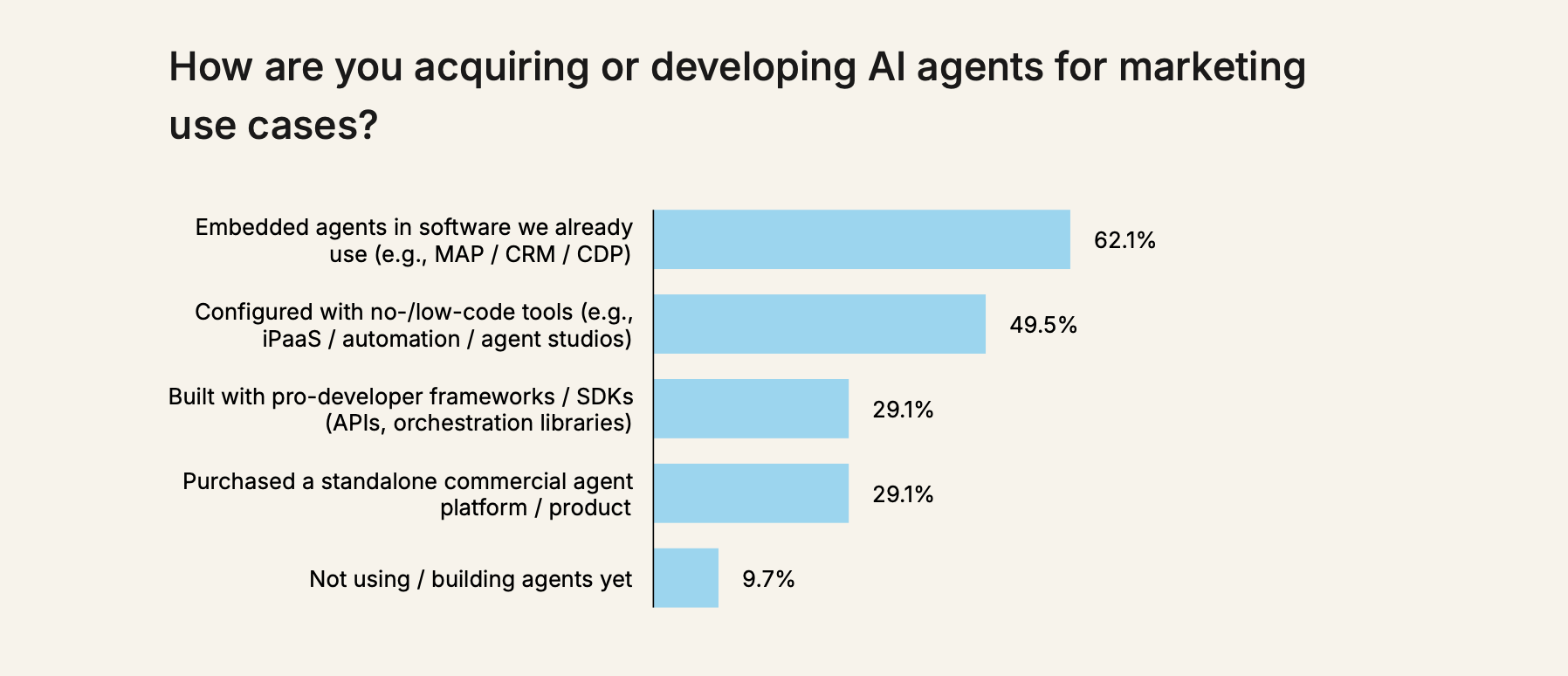
Most AI capabilities in marketing today are embedded directly inside core platforms. Major ad networks, CRMs, marketing automation systems, and analytics tools have launched native AI features over the past year. These built-in capabilities are adopted fastest because they sit inside existing workflows.
The second integration model sits above core systems. Many teams introduce AI through no-code and low-code automation platforms that orchestrate workflows across tools. These evolved integration platforms connect data sources, trigger actions, and automate cross-platform processes without custom engineering.
When evaluating a tool, determine:
• Whether it integrates natively with your existing platforms
• Whether it connects through automation or integration layers
• Whether it can read from and write back to execution systems
• Whether it inherits your existing data governance and naming logic
Tools that sit outside these integration paths create parallel processes and inconsistent data. Priority should go to AI capabilities that plug directly into your current stack, reinforce existing workflows, and accelerate execution without introducing new operational complexity.
3. Evaluate Intelligence Depth, Not Just Automation
Many tools automate tasks. Fewer provide decision intelligence. Assess whether the tool simply executes rules or learns from performance data. Look for capabilities such as predictive scoring, anomaly detection, adaptive optimization, or natural-language performance exploration.
The objective is not faster execution. It is smarter execution based on revenue and lifecycle outcomes.
4. Test Usability in Real Workflows
AI adoption fails when tools do not fit daily operations. Evaluate how campaign managers, analysts, and executives will interact with the system. Check whether insights are accessible without technical configuration. Review training requirements and onboarding time.
A useful AI tool reduces dependency on specialists. It accelerates decision-making across roles.
5. Model Total Cost Against Financial Impact
AI pricing varies widely. Consider subscription fees, integration effort, training, and ongoing support. Then estimate impact on conversion uplift, CAC reduction, retention improvement, and productivity gains.
A viable tool should show a clear path to margin improvement or growth acceleration. If ROI cannot be modeled, adoption risk is high.
AI Marketing Analytics & Intelligence Tools
For enterprise teams drowning in data, AI-powered analytics tools are game-changers. These platforms unify marketing data across channels and apply AI technologies to deliver real-time insights, anomaly detection, and even natural language Q&A.
The value is faster decision-making and reduced manual reporting, freeing your analytics team to focus on strategy.

1. Improvado AI Agent
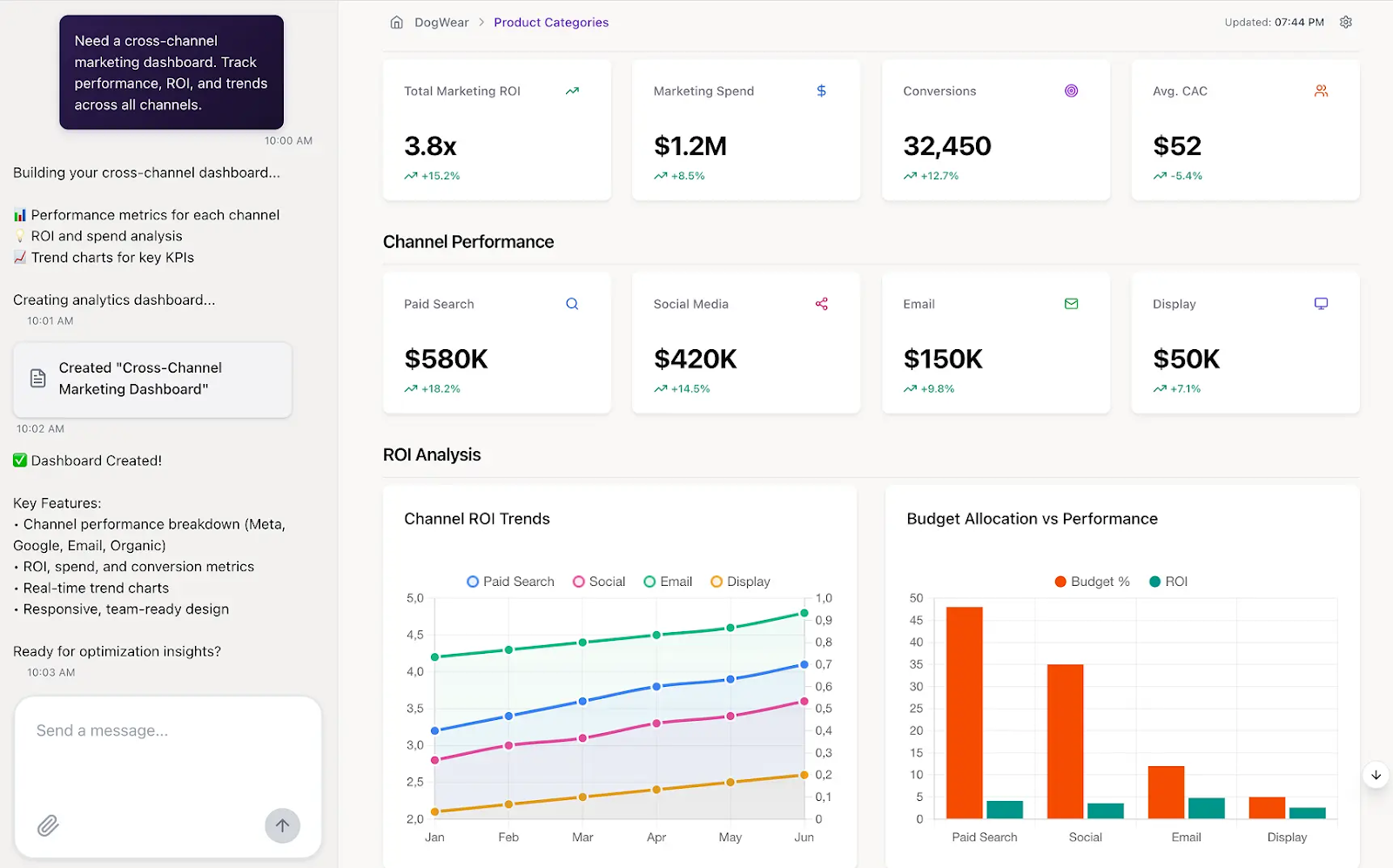
Best for: Marketing, growth, and analytics teams that need instant answers from complex cross-channel data. Especially valuable where manual reporting, attribution analysis, and dashboard maintenance slow decision-making.
Starting price: Custom plans, talk to the sales team to get a quote.
Key AI features:
- Natural-language performance analysis across unified marketing and revenue data
- On-demand dashboard creation from plain-English requests
- Automated insight generation and anomaly explanation
- AI-assisted data extraction and transformation and metric standardization
Primary use case:
- AI-driven analysis: Ask business questions directly. Receive explained answers, not just charts. Examples: “Which channels drive funded accounts?” or “Where did CAC increase this week?”
- Dashboarding: Generate and customize dashboards using natural language. Save views for recurring reporting. Share across teams with consistent definitions.
- Data transformation and preparation: Configure joins, metric logic, and dataset structures through AI-assisted instructions instead of manual SQL or engineering tickets.
ROI impact: Clients report ~30% productivity gains after automating marketing reporting with Improvado. By consolidating data and applying AI-driven analysis, teams reclaim hours previously spent on data prep and manual dashboards. That time shifts to experimentation, optimization, and strategic growth work.
How Does It Work?
AI agent runs on the Improvado data platform, which collects, stores, and prepares your marketing data for analysis.
When you ask the agent a question, it translates your request into SQL and queries the data to present you with the findings. You can ask follow-up questions to delve deeper into the data.
AI Agent eliminates the barriers between marketers and their data. You no longer need to know SQL or understand every nuance of your database structure. Instead, you can directly communicate with your data using natural language through a user-friendly UI.
2. ChatGPT-4 by OpenAI
Best for: Marketing and analytics teams that need fast exploratory analysis, idea generation, and flexible problem-solving. Useful when teams want an AI layer to interpret data, draft insights, and support decision-making without switching tools.
Starting price: $20/month for ChatGPT Plus.
Key AI features:
- Natural-language querying and interpretation of marketing data
- Rapid exploratory analysis and hypothesis generation
- Drafting performance summaries and executive-ready insights
- Scenario modeling and forecasting logic support
- Code and formula generation for analytics workflows
Primary use case: DIY analytics and automation. Marketing ops or analysts at smaller teams use ChatGPT as an AI assistant to crunch numbers or analyze performance without writing code.
For instance, you can feed in campaign CSV files and ask for key insights or have it draft a performance summary. It’s ideal for teams without a full data science staff, though enterprises use it for brainstorming and first-pass analysis (with caution on data privacy – read out guide on corporate LLM use policy).
3. CallRail Conversation Intelligence
Best for: Marketing and revenue teams that rely on phone calls as a conversion channel. Especially valuable for industries where leads convert through sales calls, consultations, or support conversations and where understanding call quality directly impacts ROI.
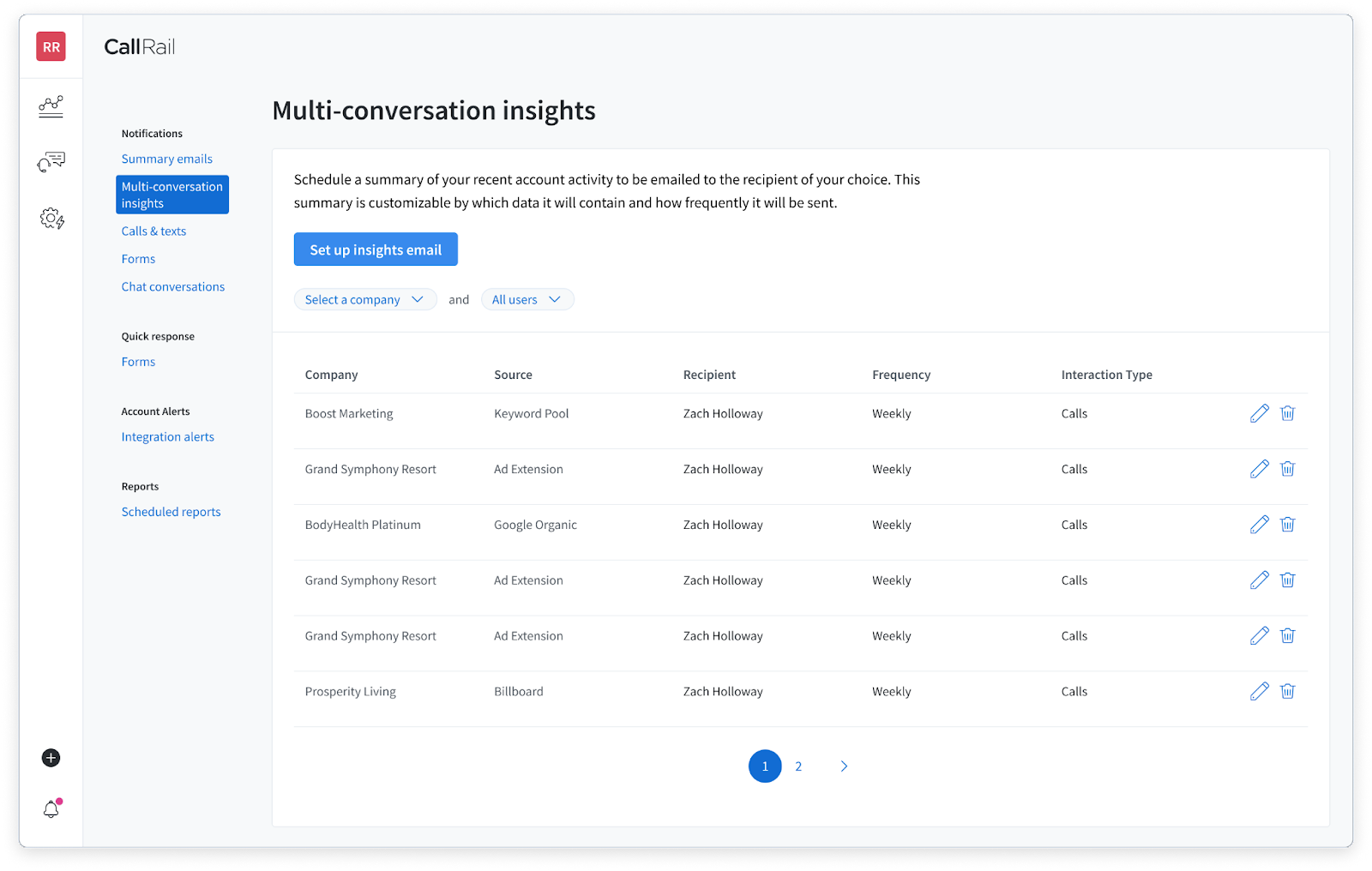
Key AI features:
- Automatic call transcription and recording analysis
- AI-powered keyword and intent detection
- Conversation scoring and lead quality classification
- Call attribution tied to campaigns and channels
- Automated tagging and routing based on conversation content
Starting price: $90/month (annual plan).
Primary use case:
- AI-driven call analysis: Calls are transcribed and analyzed automatically. Teams identify purchase intent, objections, competitor mentions, and conversion signals without listening to recordings manually.
- Campaign attribution: Phone conversions are tied back to ads, keywords, landing pages, and channels. This closes a major blind spot in marketing analytics where call revenue is often disconnected from digital spend.
- Sales and support optimization: Conversation insights highlight coaching needs, script effectiveness, and common friction points. Marketing and sales alignment improves because lead quality is measured, not assumed.
Content Creation & SEO AI Tools
Creating high-quality content at scale is a constant challenge for marketing teams. AI tools for content and SEO leverage LLMs, computer vision, and other AI tech to generate copy, visuals, and even videos in a fraction of the time.
The payoff is huge for enterprises: consistent content output across global markets, data-driven SEO optimization, and freed-up creative resources.
Below are top AI content tools and what they offer.
4. Jasper.ai
Best for: Marketing teams that need to produce high volumes of written content quickly while maintaining consistent tone and brand voice. Particularly useful for paid ads, landing pages, lifecycle emails, and content marketing programs operating at scale.
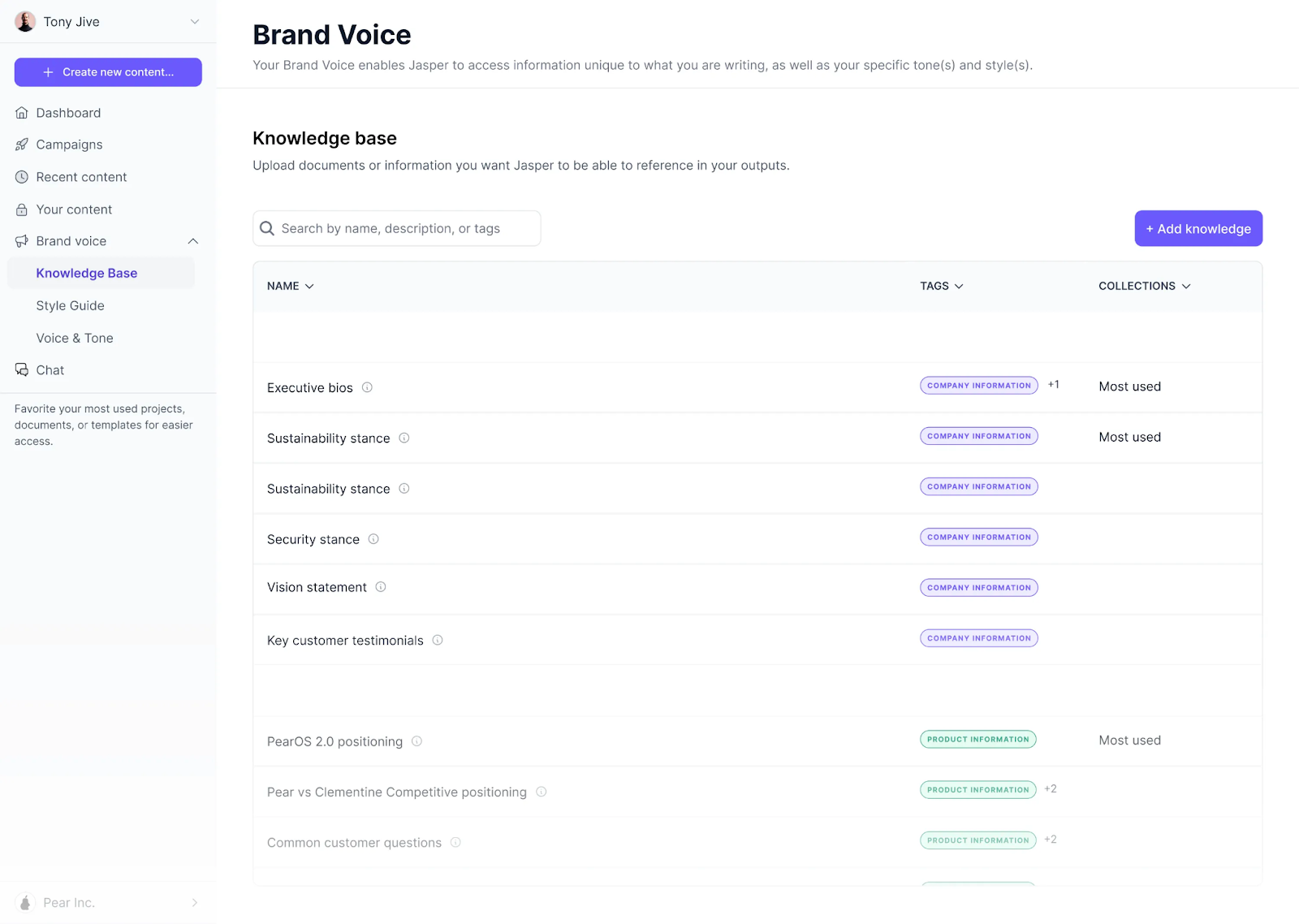
Key AI features:
- AI-generated copy for ads, emails, blogs, and landing pages
- Brand voice training and tone consistency controls
- Campaign-specific content templates
- Multi-variant content generation for testing
- Collaboration and workflow management for content teams
Starting price: $39/month (annual billing).
Primary use case: Content creation at scale without freelance overload. Enterprise content teams use Jasper to draft long-form articles, product descriptions, and email campaigns faster.
For instance, an e-commerce retailer can generate hundreds of product descriptions with a consistent voice, then have writers lightly edit. Jasper ensures consistency and can reduce writing time by 80% for first drafts. It’s also multilingual (25+ languages), supporting global content needs.
5. Prepostseo
Best for: Marketing and content teams that need quick content quality checks before publishing. Useful for SEO workflows, content editing, and ensuring text originality and readability at scale.
Key AI features:
- Plagiarism detection across web sources
- Grammar and readability checking
- Paraphrasing and text rewriting tools
- Keyword density and SEO analysis
- Summarization and text compression tools
Starting price: Free plan available; premium from ~$4.17/month.
Primary use case: Lightweight content needs and cleanup. Marketing teams use Prepostseo to quickly brainstorm copy variations or clean up drafts. An enterprise social media manager, for example, might generate a week’s worth of Facebook post captions, then use the built-in plagiarism checker to verify originality.
It’s an excellent aide for ensuring error-free, optimized copy when resources are tight.
6. Synthesia
Best for: AI-generated marketing videos without a video crew, including multilingual product demos or personalized video messages.
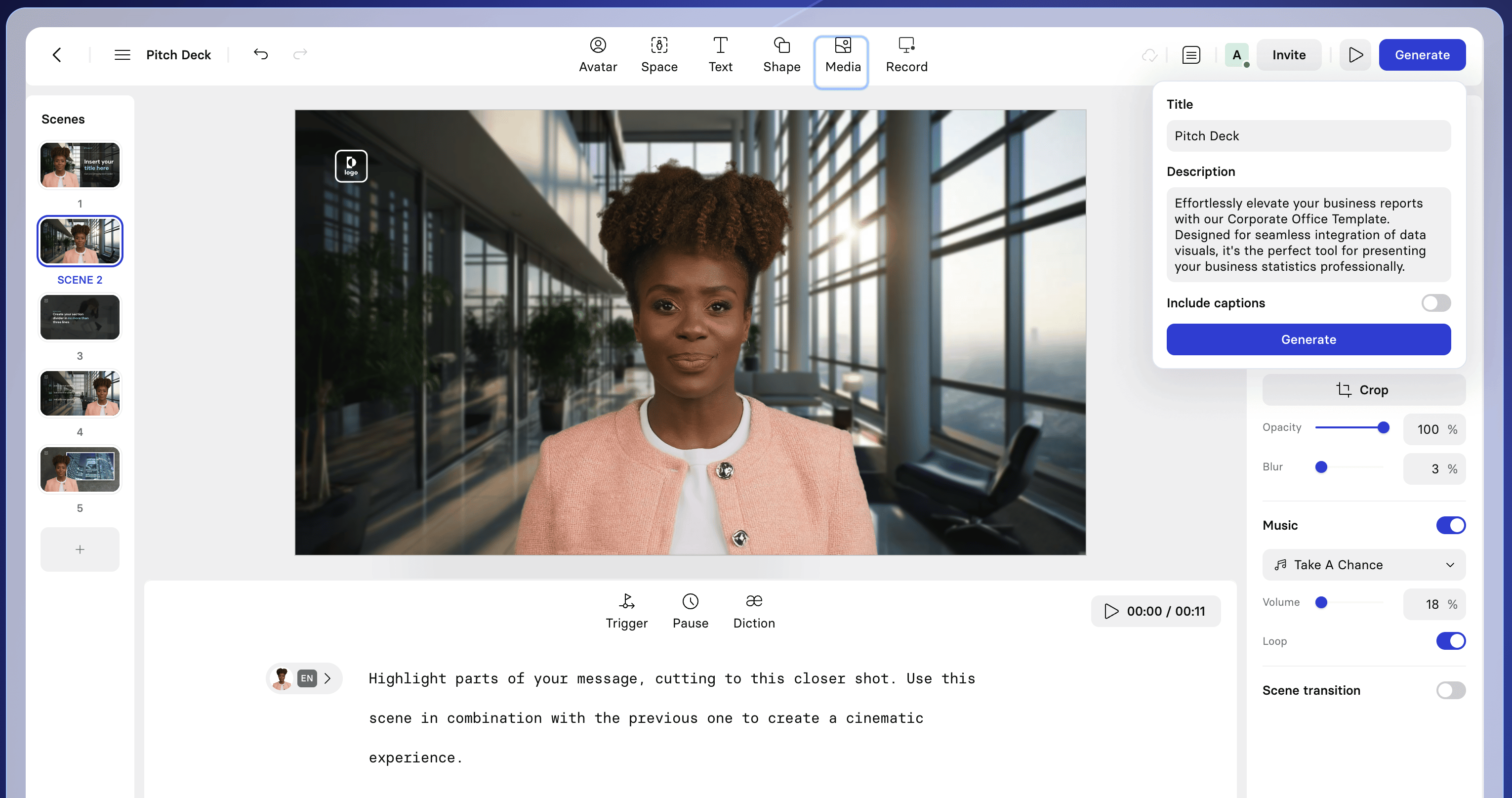
Key AI features:
- Text-to-video with customizable AI avatars
- Scene builder with brand templates
- Automatic voiceovers in 140+ languages
- Video subtitle and translation support
- Voice cloning for consistent brand narration
Starting price: Free demo videos, paid plans start at $30/month (approximately, depending on features).
Primary use case: Companies use Synthesia to localize tutorials and ads without hiring actors or studios. For example, a SaaS company can create an onboarding video in 10 languages by simply translating the script; the AI avatars will speak each language fluently.
This drastically cuts production costs and time. Marketing teams also use it for quick turnaround videos (like event promos or FAQs) that would be impractical to film traditionally.
7. Canva AI
Best for: Quick, on-brand design creation for teams without dedicated designers, using AI to expedite the process.
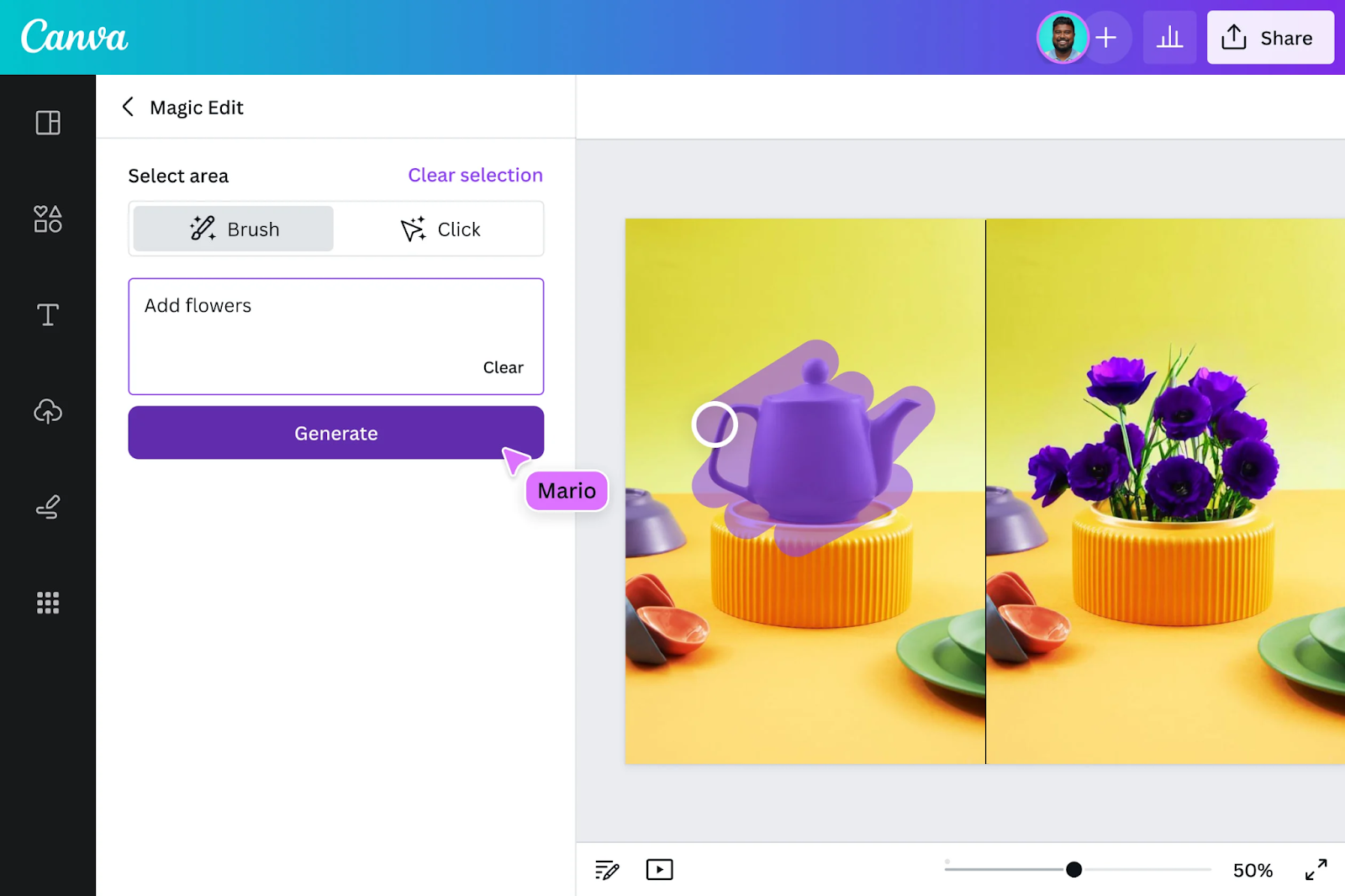
Key AI features:
- Magic Write: AI copy generator for captions and headlines
- Magic Design: Auto-layout generator from brand content
- Magic Media: Text-to-image/video generation
- Magic Switch: Auto-resizes assets across formats
- Style/tone customization and AI-powered translations
Starting price: Free for basic use. Canva Pro with Magic Studio features is ~$15/user/month (enterprise plans available).
Primary use case: Democratizing creative production.
A marketing ops leader can empower regional teams to create their own campaign visuals using Canva AI while enforcing brand guidelines. For example, with a few prompts, a field marketer can get dozens of ad banner variations generated and then tweak the best ones.
The AI features cut down iteration loops significantly. What used to take a designer a full day can be done in an hour by a marketer, then lightly refined by design. This speeds up go-to-market by 3-5× for visual content.
8. Midjourney
Best for: AI-generated images and art to spice up campaigns or creative brainstorming.
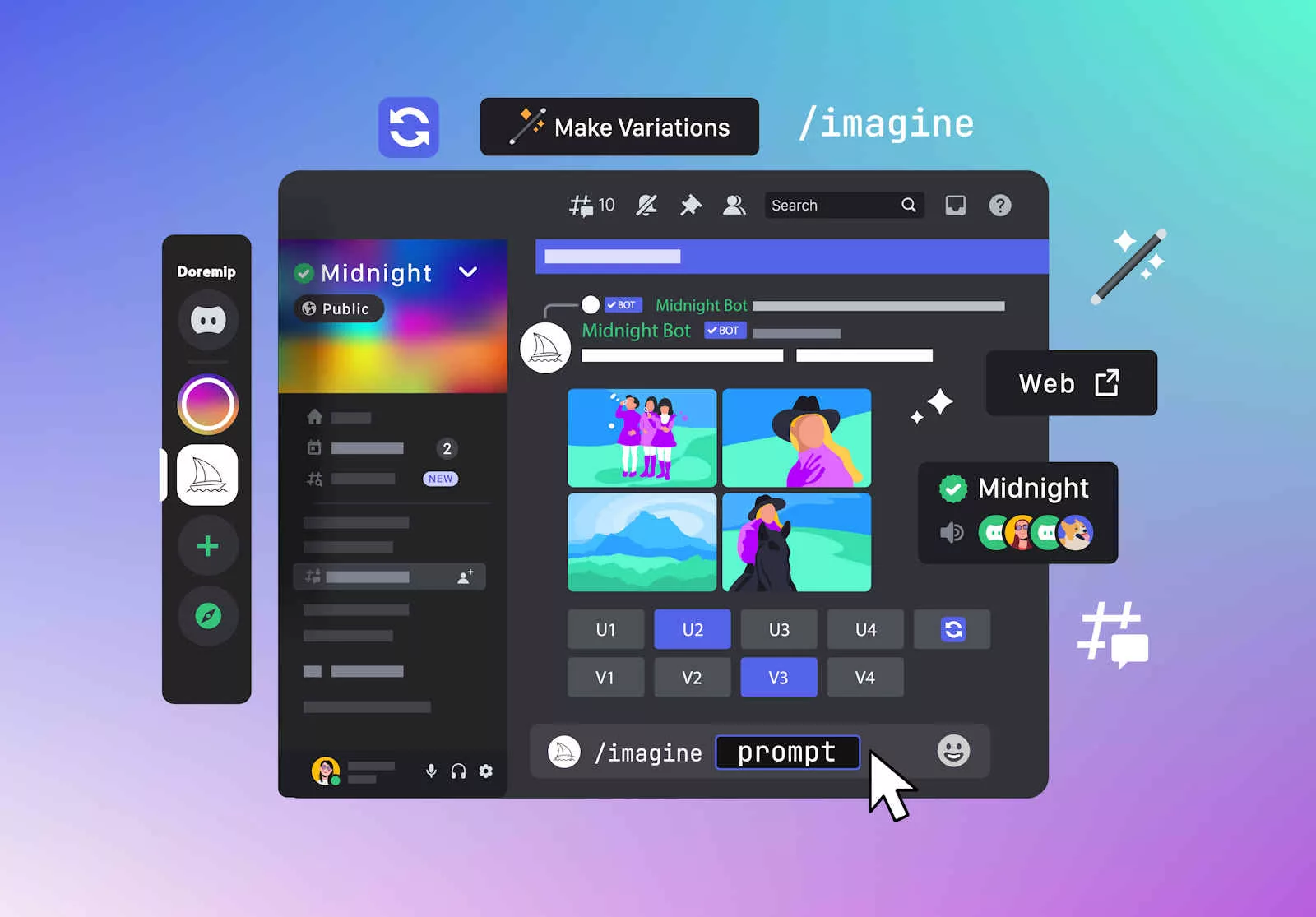
Key AI features:
- Natural language image generation via Discord
- Stylization, prompt remixing, and batch creation
- Artistic controls: chaos, versioning, aspect ratios
- High-res exports for print or web use
Starting price: ~$10/month for basic plan (limited images).
Primary use case: Creating unique visuals without stock photos. Brand creative teams use Midjourney to generate campaign backgrounds, editorial illustrations, or concept art.
For instance, instead of buying generic stock images, a marketer might generate a custom surreal graphic for a blog post that better catches the eye.
Midjourney’s outputs often look like they came from a professional artist. However, consistency across many images can be a challenge; it’s best used for one-off needs or concepting.
9. Async (former Podcastle)
Best for: Teams and creators that produce audio and video content as part of their marketing mix. Especially useful for brands investing in podcasts, on-demand audio, or social video series where quality and speed matter.
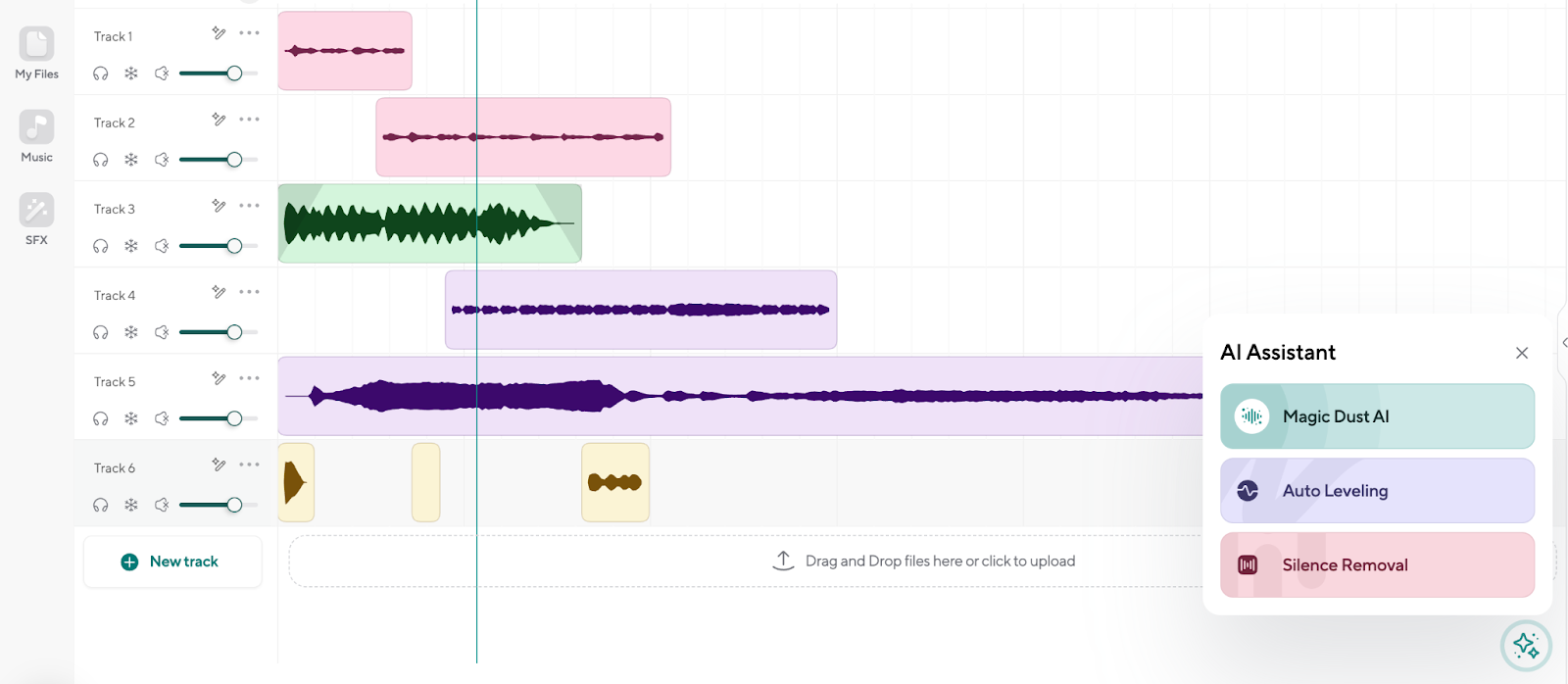
Key AI features:
- AI-assisted audio recording and editing
- Automated noise reduction and enhancement
- Text-to-speech and voice cloning capabilities
- Instant transcription for search and repurposing
- Multi-format export for social, web, and podcast distribution
Starting price: Free tier for basic features; paid plans from $11.99/month.
Primary use case: Scaling spoken content and podcasts.
A content marketing team can use Podcastle to produce a weekly podcast or audio newsletter without a full studio setup.
For example, you could draft an article and have Podcastle convert it to a spoken-word audio with a human-like voice, giving your audience a podcast option. It saves time in recording and post-production; small teams can produce professional audio in hours instead of days. It’s also used to repurpose blogs into audio for accessibility and extra reach.
10. Grammarly
Best for: Real-time writing optimization, ensuring all marketing communications are clear, correct, and on-tone.
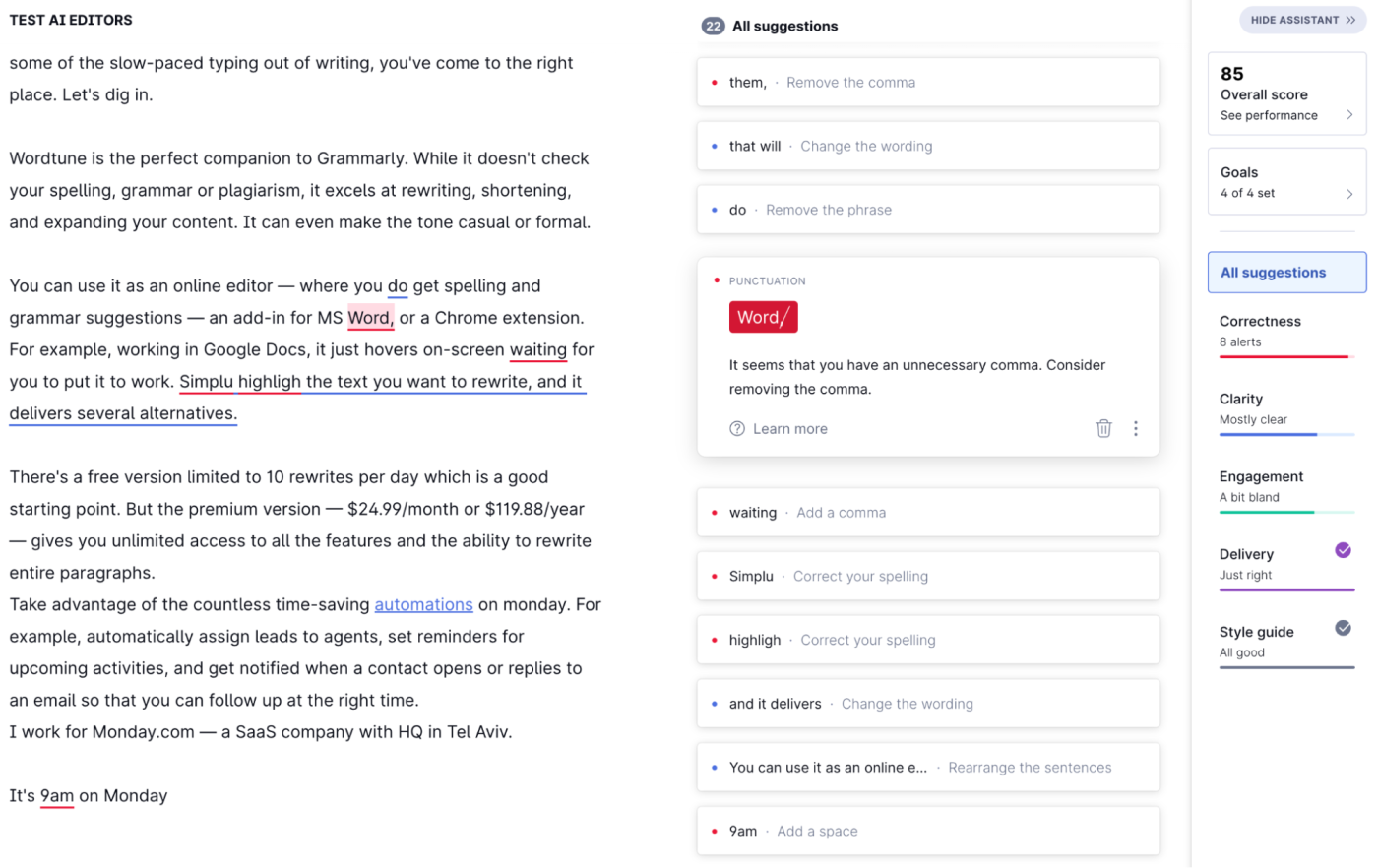
Key AI features:
- Grammar and punctuation correction
- Tone detector and clarity rewriter
- AI-powered full-sentence rewrites and suggestions
- Brand Tone controls and audience targeting
- Plagiarism checker and citation tools
Starting price: Free basic plan; Premium starts at $12/month per user. Enterprise plans add style guide enforcement.
Primary use case: Quality control and consistency. Enterprises deploy Grammarly across content, social, and comms teams to maintain a unified voice.
Imagine a global marketing team where not everyone is a native English writer: Grammarly catches language issues and tone mismatches instantly, preventing potentially embarrassing mistakes before content goes live. It’s like having an AI copy editor available 24/7. Teams report significant reductions in editing time and fewer rounds of revisions when writers use these AI suggestions proactively.
11. Freepik AI Text Generator
Best for: Quick generation of on-brand copy for web, social, and ads
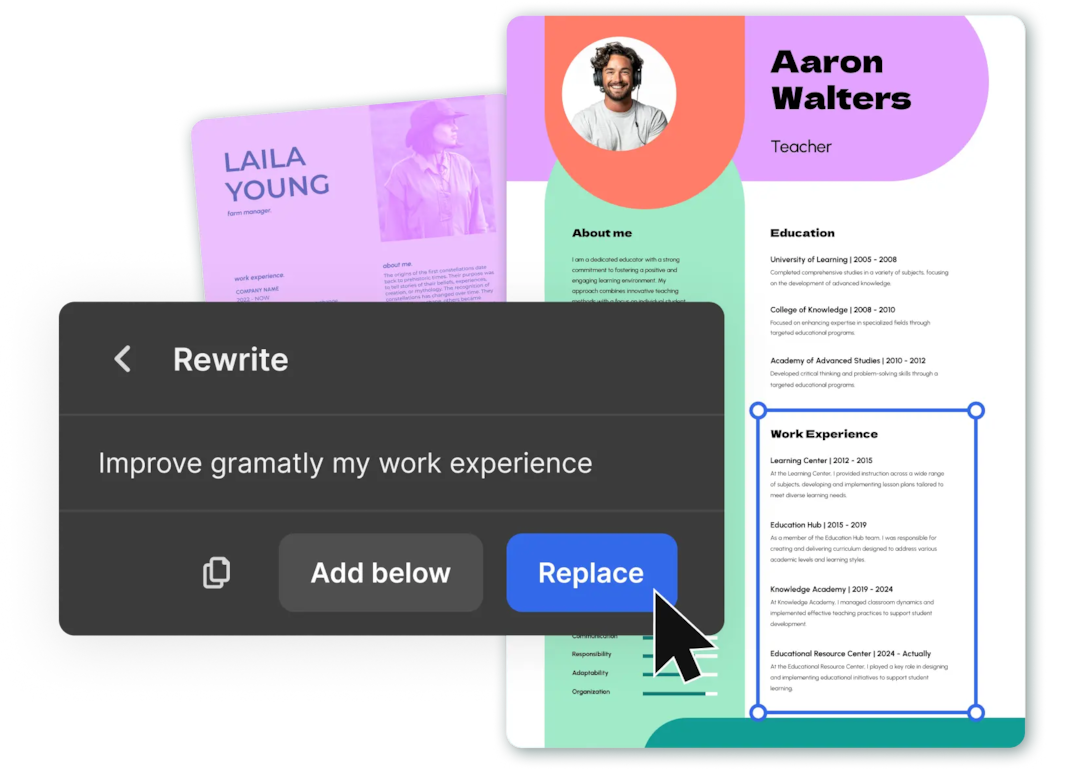
Key AI features:
- Instant copy generation for multiple use cases
- Custom tone and length controls
- Seamless integration with Freepik design tools
- Multilingual content support
Starting price: Free limited use; Premium from ~$12/month for unlimited downloads (the AI tools are included).
Primary use case: Creative ideation and quick assets.
When you need a visual but don’t have a designer on hand, Freepik’s AI helps craft the initial draft. A social media marketer could generate a quick infographic background and accompanying post text in minutes.
It’s also useful for A/B testing creatives: you can produce multiple variants of an image or headline and see which performs best. While the quality may not always match a skilled designer’s work for final deliverables, it’s often good enough for many campaigns or at least for mockups to accelerate creative approval.
12. SurferSEO
Best for: Content, SEO, and growth teams focused on organic search performance. Particularly valuable when optimizing long-form content, landing pages, and blogs to rank for targeted keywords while aligning with search intent.
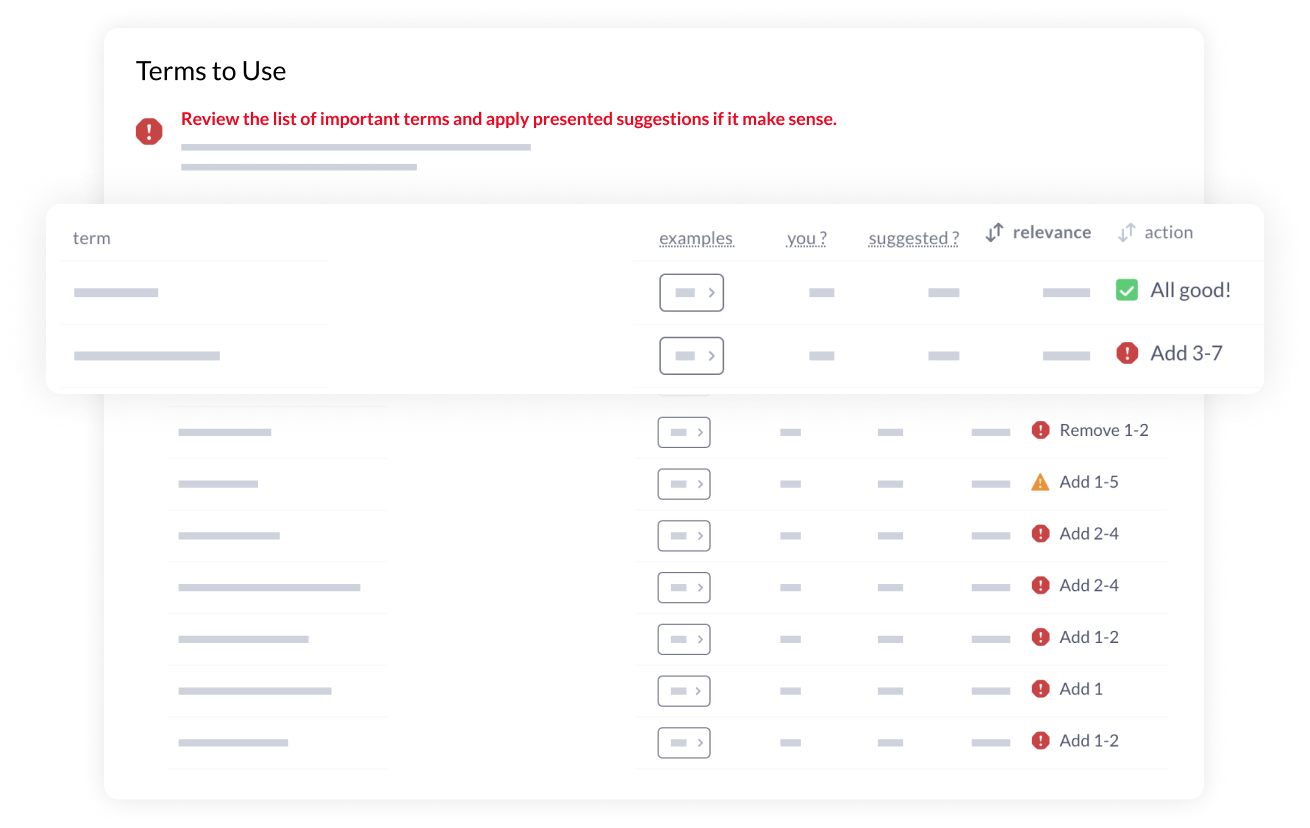
Key AI features:
- Content analysis against top-ranking pages
- Real-time keyword and semantic suggestions
- Topic and structure recommendations informed by SERP data
- Content scoring based on optimization metrics
- Integrated auditing and competitor benchmarking
Starting price: ~$29/month for basic plan (limited articles per month).
Primary use case: Data-driven content writing and optimization.
Content teams at enterprises use Surfer to refresh old blog posts or create new ones that can rank on page 1. For example, if you’re writing an article on “B2B marketing trends”, SurferSEO might tell you to mention certain trending subtopics or include 15 specific keywords the top 10 Google results all use.
13. Copy.ai
Best for: Marketing teams generating multi-format content quickly
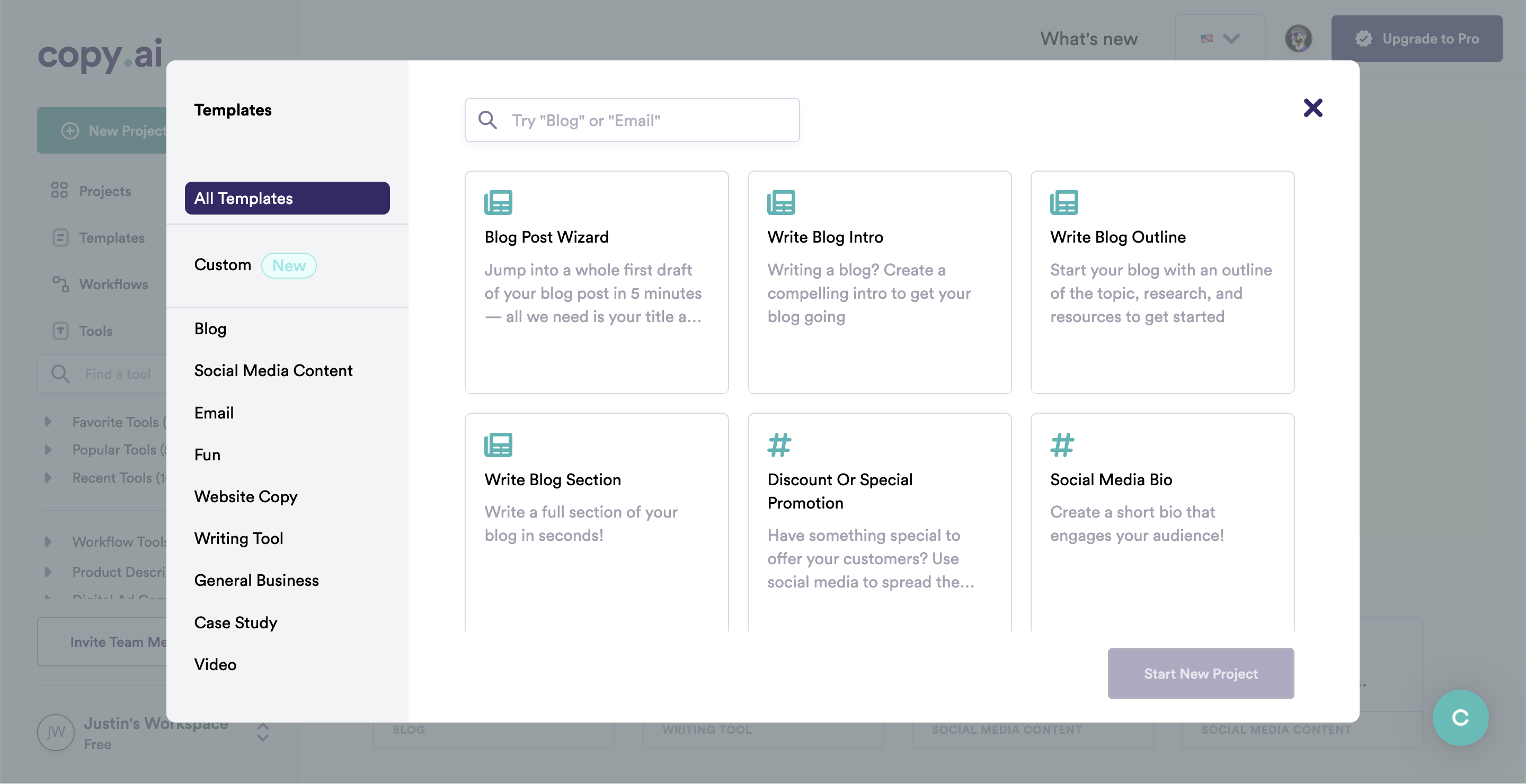
Key Features:
- 90+ templates for content creation and marketing workflows
- Brand Voice customization for tone control
- AI-powered campaign builders and chat-based assistant
- Chrome extension for on-the-go copywriting
- Workflow automation and API support for enterprise teams
- Similar to Jasper, Copy.ai provides multiple workflow templates for various use cases, for example, transforming documents into FAQs, crafting targeted Google Ads copy, running competitor analysis from G2, and others.
Starting price: $49/month for Pro (5 user seats included).
Primary use case: Campaign copy at scale.
Think of a digital agency producing copy for 100s of ads or a large enterprise launching a multi-channel campaign. Copy.ai lets you quickly produce and test many variants.
For example, a growth marketer can generate 10 versions of a Google Ad headline tailored to different audience segments, then pick the best. It accelerates creative testing and ensures you always have fresh copy ideas.
While human refinement is needed for the final polish, Copy.ai often nails 80% of the work in seconds, massively increasing output.
14. Hypotenuse AI
Best for: Hypotenuse AI is an AI writing assistant that generates quality content at scale. Especially valuable for ecommerce, paid media, and content marketing where both quantity and relevance drive performance.
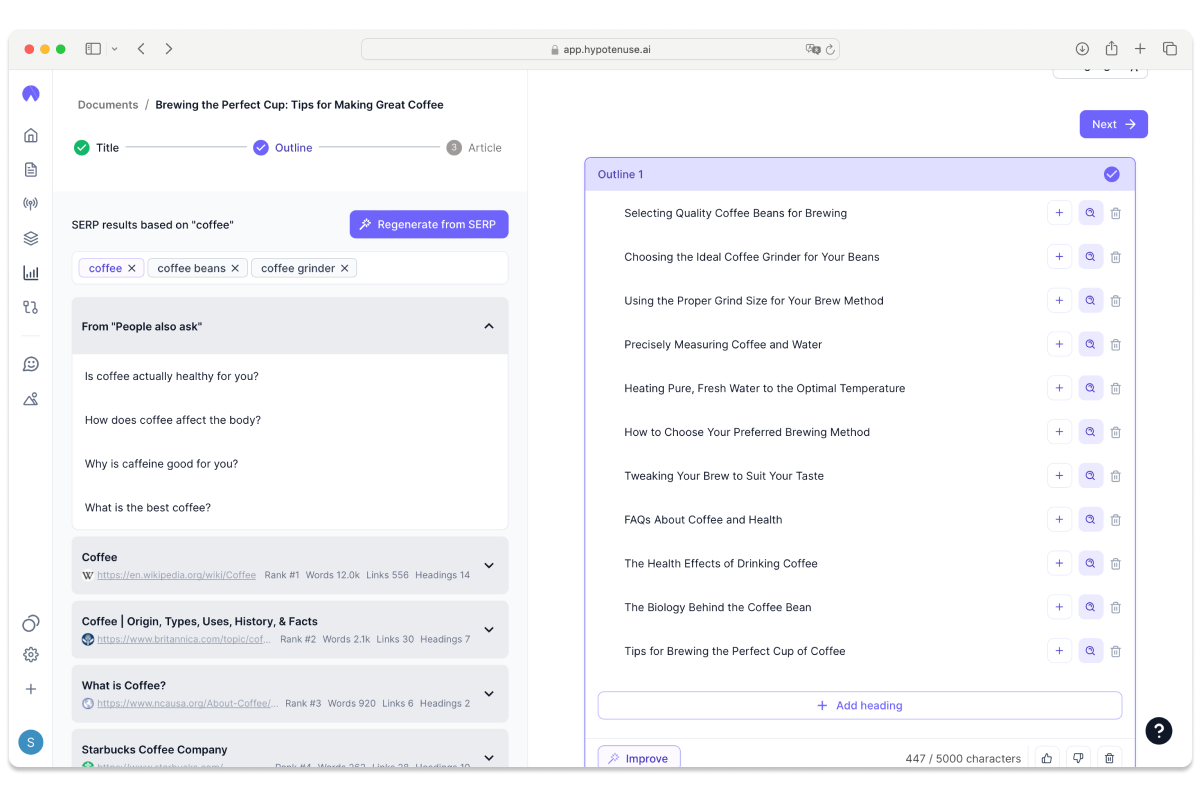
Key AI features:
- Generative copy for product descriptions, landing pages, ads, and emails
- Audience and intent-aware content templates
- Tone, voice, and style controls for brand consistency
- Bulk content generation for rapid scaling
- Content variant generation for multivariate testing
Starting price: Starts around $29/month (with limits on content pieces; custom pricing for large volumes).
Primary use case: Automating online storefront content. Large retailers or marketplaces use Hypotenuse to keep up with ever-changing inventory.
For example, when launching 500 new SKUs, an e-commerce team can use Hypotenuse to instantly create unique descriptions for each item (including relevant keywords), instead of writing each by hand. This not only saves countless hours but also ensures consistency in style.
Many brands pair Hypotenuse with human editors in a workflow: AI drafts the content, humans review for accuracy and brand voice tweaks. The result is a 10× faster content pipeline for product marketing.
15. Visme
Best for: Marketing, analytics, and communications teams that need to transform complex data into clear visual narratives. Particularly valuable when presenting performance insights to stakeholders, executives, or cross-functional partners.
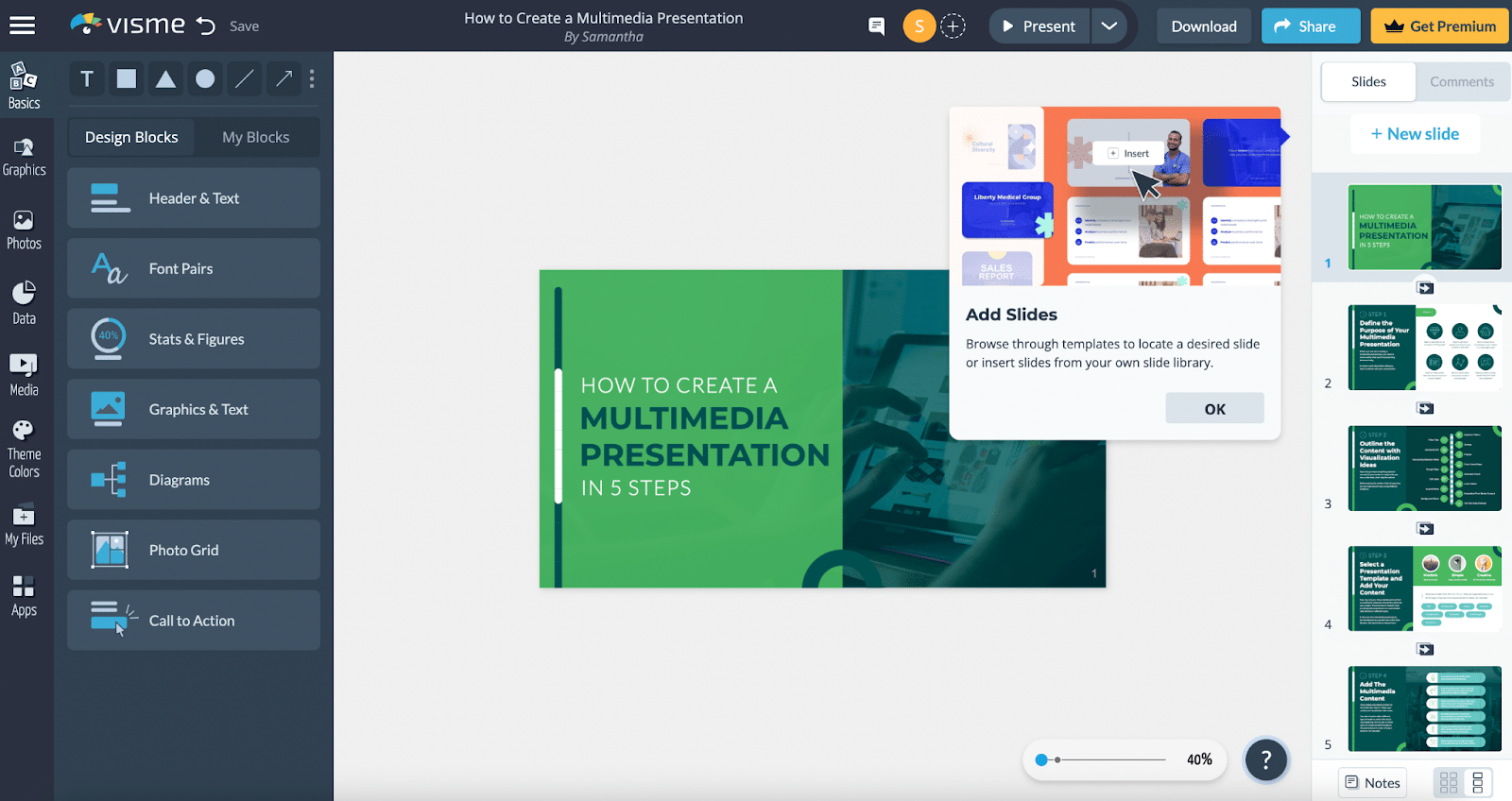
Key AI features:
- AI-assisted design recommendations for charts and layouts
- Automated visualization suggestions based on input data
- Natural-language to visual conversion for key insights
- Smart templates optimized for business presentations
- Export-ready infographics, reports, and dashboards
Starting price: Free plan available; paid plans start at ~$12/month (billed annually).
Primary use case: Fast-turnaround marketing collateral.
Enterprises use Visme for everything from pitch decks to Instagram infographics without waiting on design teams. Suppose a marketing manager needs a quick report for a meeting: Visme can generate a professional-looking slide deck with the data provided, complete with on-brand graphics and AI-written captions.
Or for content marketing, a team can whip up engaging infographics from blog data in an hour. The platform’s collaborative features also allow multiple team members to edit in real-time, which speeds up reviews.
Content & SEO AI Tools Comparison
The table below summarizes key features and pricing of popular AI tools in this category.
| Tool | Best For | Top AI Features | Starting Price |
|---|---|---|---|
| Jasper.ai | Long-form copywriting with brand tone | Templates (50+ use cases); Brand Voice mimicry; SEO mode with Surfer integration | $39/month (annual) |
| Prepostseo | Quick content generation and optimization | Paragraph generator; AI grammar and plagiarism checks | Free basic; approximately $4.17/month |
| Synthesia | Video content with AI avatars | Text-to-video in 140+ languages; customizable AI avatars | $30/month (individual) |
| Canva AI | Fast graphic and video design | Magic Write (copy generation); Magic Design (auto-layout); text-to-image | Included in Canva Pro (approximately $15/month) |
| Midjourney | Generating unique images and art | Text-to-image model with high creativity; prompt-based iterations | Approximately $10/month (basic plan) |
| Podcastle | Audio and podcast creation | AI voiceovers (text-to-speech); noise removal; voice cloning | Free tier; Pro $15/month |
| Grammarly | Polishing writing and tone | Real-time grammar and tone suggestions; AI rephrasing (GrammarlyGO) | Free basic; $12/month Premium |
| Freepik AI | Quick custom images and ad copy | AI image generator (from text); AI copywriter for captions | Free trial; approximately $12/month Premium |
| SurferSEO | SEO content optimization | Content score with NLP suggestions; keyword guidelines | Approximately $29/month (basic) |
| Copy.ai | High-volume copy variants | Multi-format copy generator; workflow templates; team collaboration | $49/month (5 users) |
| Hypotenuse | E-commerce product content | Bulk product description generation; ecommerce optimized language | Approximately $29/month (basic) |
| Visme | Presentations and infographics | AI Designer for layouts; AI content helper; rich template library | $12.25/month (annual) |
Best AI Messaging & Email Personalization Tools
AI is transforming email and messaging strategies by enabling hyper-personalization, predictive targeting, and real-time optimization at scale.
According to recent data, AI in email marketing has contributed to a 41% increase in revenue and a 13% uplift in click-through rates for companies leveraging it effectively.
In this section, we highlight the top AI tools for email and messenger marketing.
16. ManyChat
Best for: Chat marketing automation across Messenger, WhatsApp & SMS
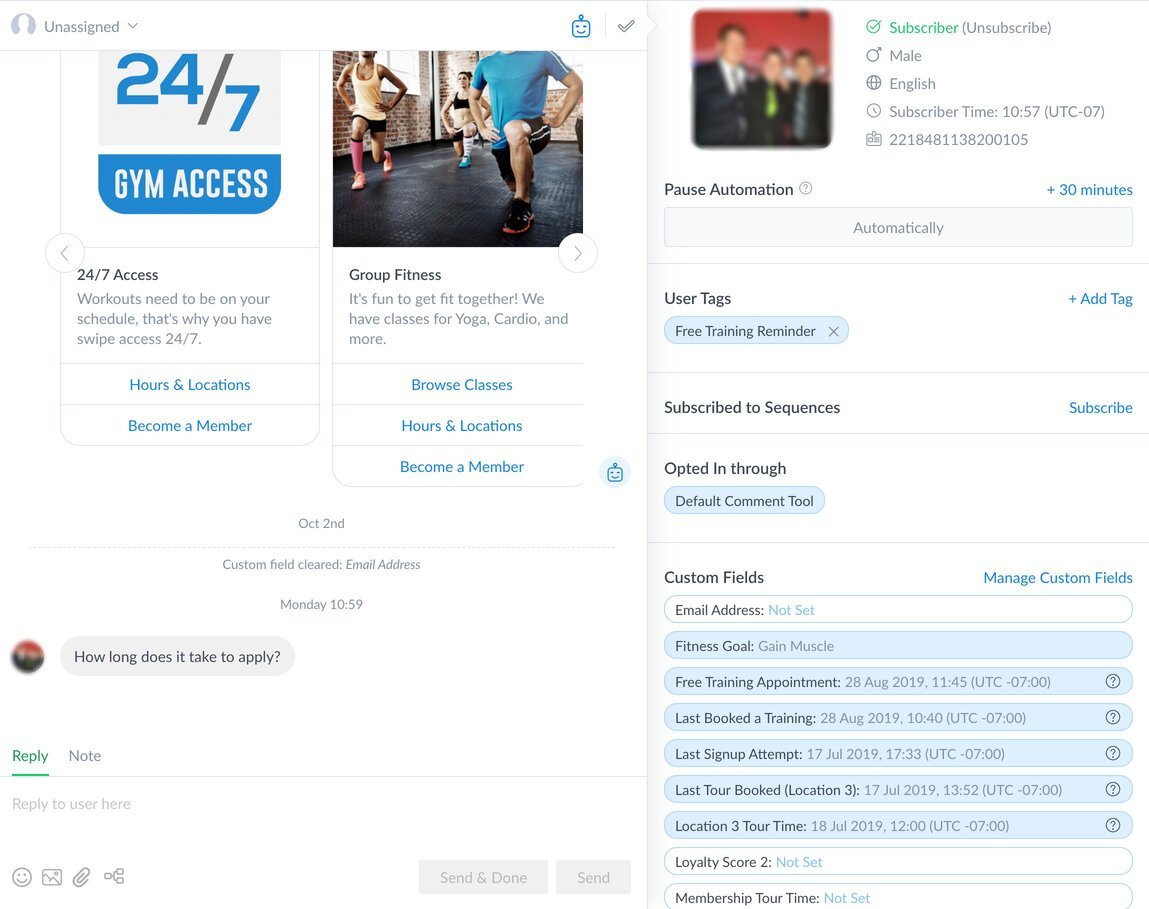
Key AI features:
- Drag-and-drop chatbot builder
- Generative AI messaging suggestions
- Lead capture and form integration
- Multichannel automation with integrations (e.g. Shopify, Zapier)
- Smart replies using ChatGPT integration
Starting price: Free for basic; Pro from $15/month (pricing scales with number of subscribers).
Primary use case: Automating customer engagement on social media.
Enterprises use ManyChat to handle the influx of customer DMs and comments. For example, a retailer can set up a Messenger bot that answers product FAQs, collects email signups with a friendly quiz, and hands off to a human agent if needed.
ManyChat’s AI helps ensure the bot’s language is natural and on-brand. The result is higher responsiveness (24/7 instant replies) and lead funnels that operate hands-free. It’s common to see uplift in engagement and even direct sales via these AI-driven chats.
17. Reply.io
Best for: Email personalization and multi-channel outreach at scale
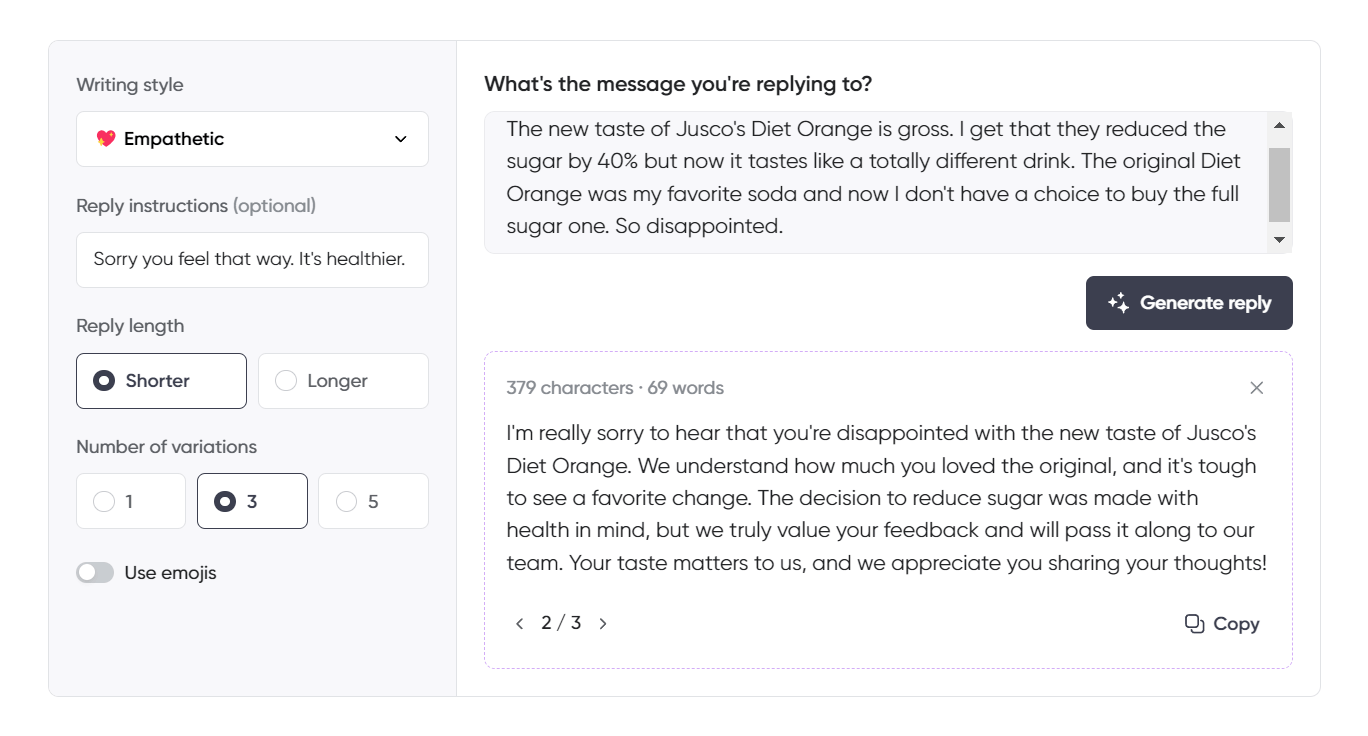
Key AI features:
- AI email assistant for subject lines and message tone
- Multichannel workflows (email, LinkedIn, SMS)
- Smart reply detection and lead scoring
- CRM sync with tools like HubSpot and Salesforce
- Analytics on campaign performance
Starting price: ~$60/month per user for the Sales Engagement edition (with AI features included).
Primary use case: Sales pipeline automation.
SDR teams at B2B companies use Reply.io to contact thousands of prospects in a personalized way. An SDR manager might feed in a list of leads and let the AI craft slightly different intro lines for each (impossible to do manually at scale).
The platform then sequences follow-ups across email and LinkedIn, adjusting timing based on engagement. This leads to more replies and meetings booked, without adding headcount.
One notable benefit: AI personalization prevents the messages from reading like mass spam, so open and reply rates can increase significantly (some users report >30% lift in cold email responses after using AI personalization).
18. Conversica
Best for: Intelligent virtual assistants that engage and qualify leads
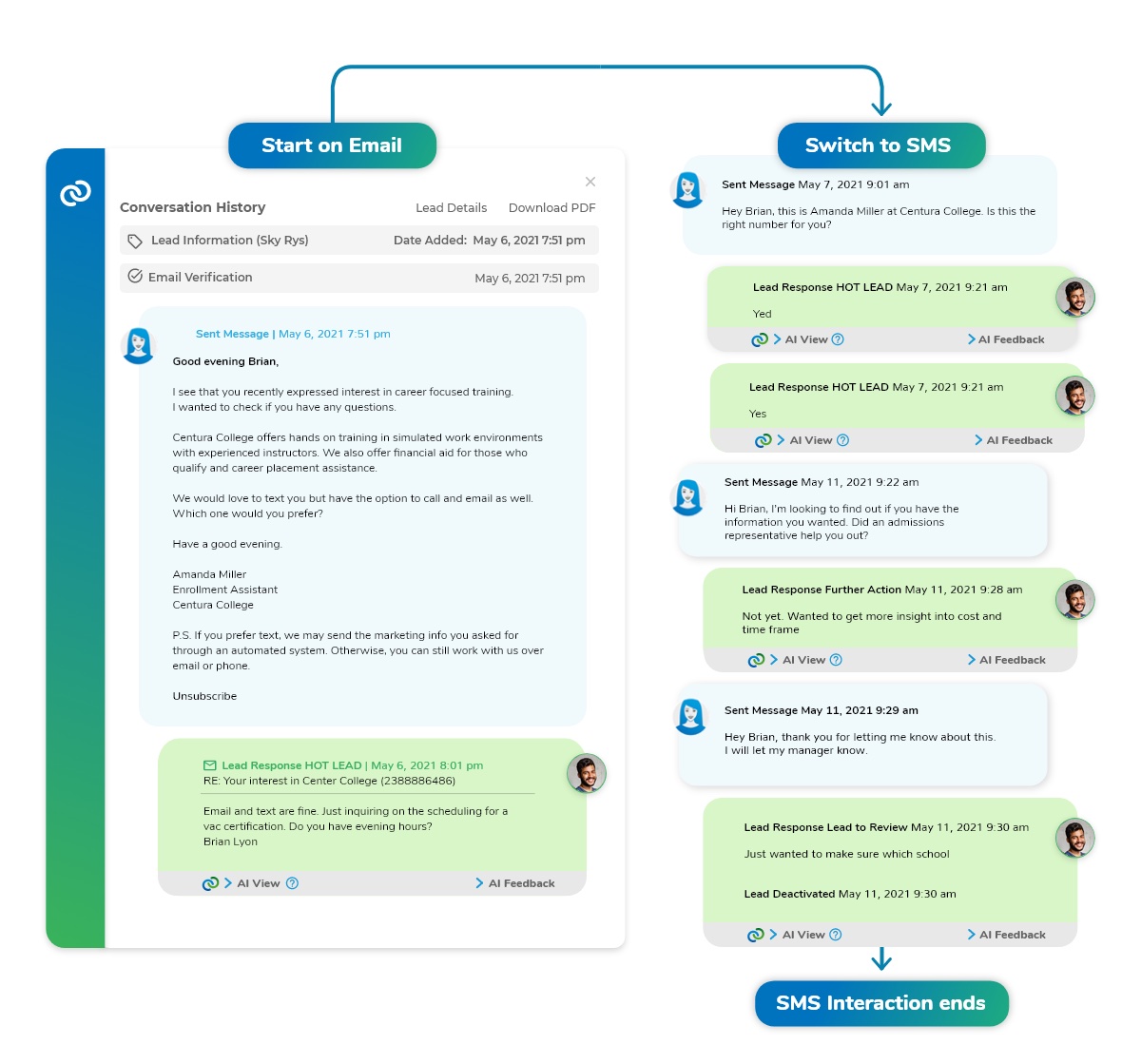
Key AI features:
- Pre-built conversation templates across sales, success, and marketing
- Customizable tone and follow-up logic
- Multi-language and multi-channel support
- AI scoring to detect buyer readiness
- CRM and MAP integration (Marketo, Salesforce, HubSpot)
Starting price: Around $2,999/month (enterprise pricing, varies by use case)
Primary use case: Scaling lead nurturing and re-engagement.
For example, a software company with thousands of old leads can have Conversica reach out to all of them, something a human team could never do thoroughly. The AI assistant might revive dormant leads by asking if they’d like a new demo or send event invites to prospects, and it will respond individually as replies come in.
19. Persado
Best for: Marketing teams seeking measurable uplifts in messaging performance across email, paid media, push notifications, and landing pages. Particularly effective where language choice directly influences conversion and revenue outcomes.
Key AI features:
- Generative messaging optimized with behavioral language models
- Emotion and intent-based copy variants tailored to audience segments
- Predictive performance scoring for language effectiveness
- Integration with campaign execution platforms for automated delivery
- Continuous learning from historical performance to refine future outputs
Starting price: Custom enterprise pricing (Persado typically works with large brands via annual contracts, no public prices).
Primary use case: Boosting campaign performance with optimized copy.
Global banks, retailers, and telecoms use Persado to improve email open and click rates and ad conversions. For example, an email marketing team can use Persado to generate 10 subject line options for a promotion, with varying emotional angles (“Don’t miss out – last chance!” vs “An offer curated just for you”).
Persado’s system might predict which will win, but it often also runs multivariate tests in real campaigns to learn audience preferences.
20. Seventh Sense
Best for: Email and lifecycle marketing teams focused on maximizing engagement and conversion through optimized send timing and frequency. Especially valuable for organizations with large subscriber bases and diverse audience behavior patterns.
Key AI features:
- Predictive send-time optimization based on individual engagement patterns
- Frequency capping to prevent audience fatigue
- Behavioral scoring to tailor delivery cadence by segment
- Integration with major email platforms for automated deployment
- Performance learning loops that refine timing logic over time
Starting price: $80/month (HubSpot edition) or $450/month (Marketo edition).
Primary use case: Increasing email engagement with timing.
Large B2B marketers and online retailers use Seventh Sense to boost open rates and clicks without changing content at all, simply by sending at optimal times. For instance, a SaaS company’s newsletter that was traditionally blasted at 9am Monday to everyone might see a jump in open rate after Seventh Sense staggers the sends over 48 hours at the best times for each recipient.
This kind of AI-driven timing can lift open rates by double digits and reduce unsubscribes (because contacts get fewer ill-timed emails). It’s essentially “send-time personalization” at scale, which is something even skilled marketers can’t do manually for thousands of contacts.
AI Tools for Messaging & Email Personalization Comparison
| Tool | Primary Use | AI Capabilities | Starting Price |
|---|---|---|---|
| ManyChat | Chatbot marketing (Messenger and others) | Drag-and-drop bot builder; AI-generated replies via GPT | Free; Pro from approximately $15/month |
| Reply.io | Sales email and LinkedIn outreach | AI-personalized emails at scale; send-time optimization; automated A/B testing | Approximately $60/month per user |
| Conversica | AI lead engagement via email | Two-way natural language conversations; automatic lead qualification | Approximately $3,000/month (enterprise) |
| Persado | AI copy for email, SMS, and ads | Generative language with emotional targeting; multivariate testing; compliance-safe output | Enterprise only (custom pricing) |
| Seventh Sense | Send-time optimization for email | Machine learning-driven optimal send times per contact; adaptive frequency control | $80/month (HubSpot) |
| Others (e.g. Optimove, Drift) | Optimove: AI segmentation and journey orchestration; Drift: AI chat for B2B (website bots and emails) | Advanced AI for personalization and conversational engagement | Varies (enterprise) |
AI Social Media Marketing Tools
While AI content generation tools will help you craft a LinkedIn or Instagram post, these AI social media solutions help analyze trends, automate postings, personalize content, and interpret engagement data.
21. Sprout Social
Best for: Centralized social media management with AI-powered insights
Pricing: Starts at $199/month (billed annually)
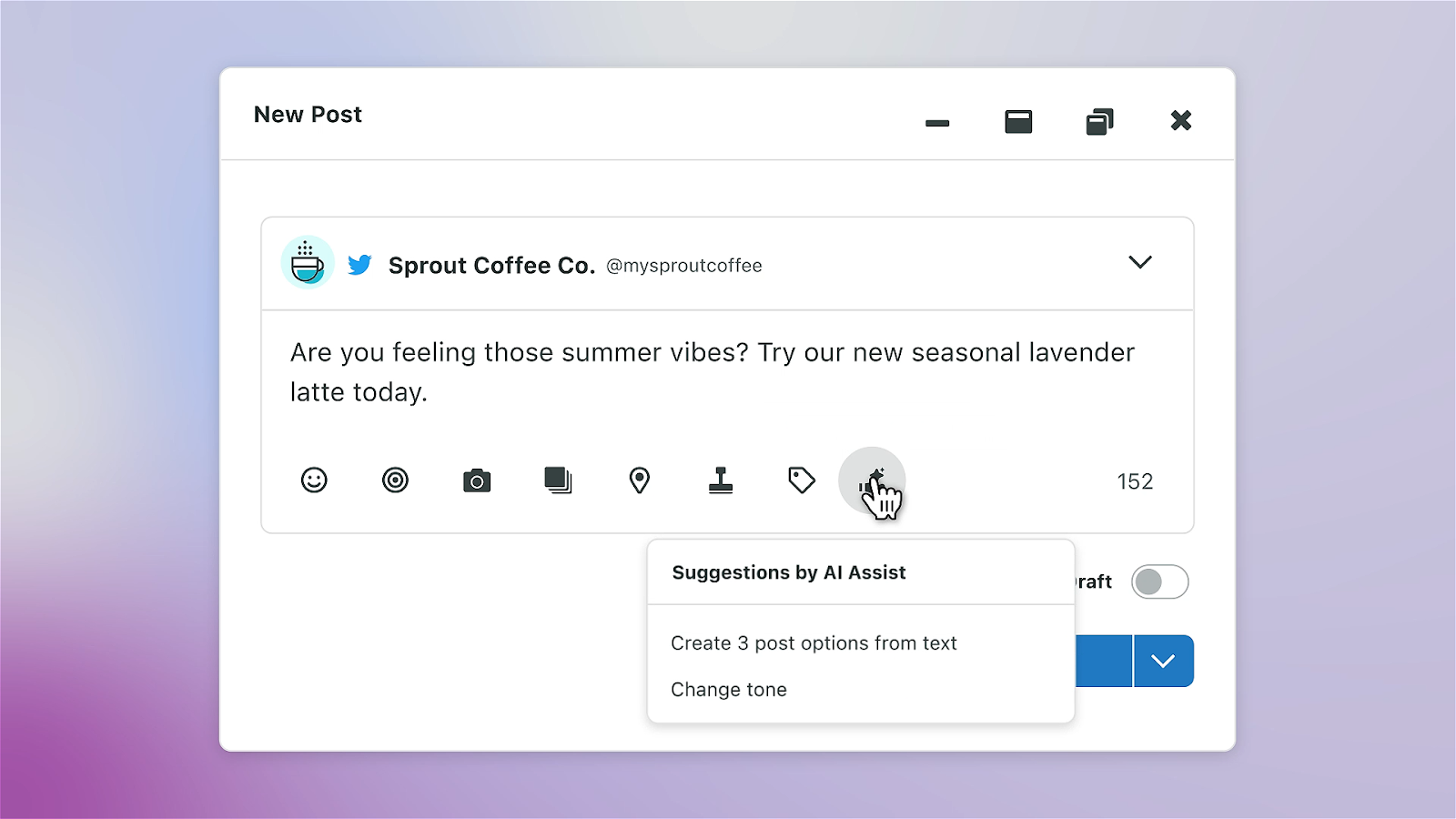
Sprout Social helps brands manage, analyze, and grow their presence across major social platforms. It integrates AI to assist in content scheduling, engagement tracking, and performance benchmarking.
Key Features:
- AI-generated post recommendations and reply suggestions
- Social listening with sentiment analysis and keyword tracking
- Performance prediction for campaigns
- Competitor and industry benchmarking
- Smart inbox for managing all platforms in one place
Sprout Social is a powerhouse for medium to large teams looking to optimize their full social content lifecycle with actionable insights.
22. FeedHive
Best for: Scheduling and optimizing social media posts using AI content prompts
Pricing: Starts at $19/month
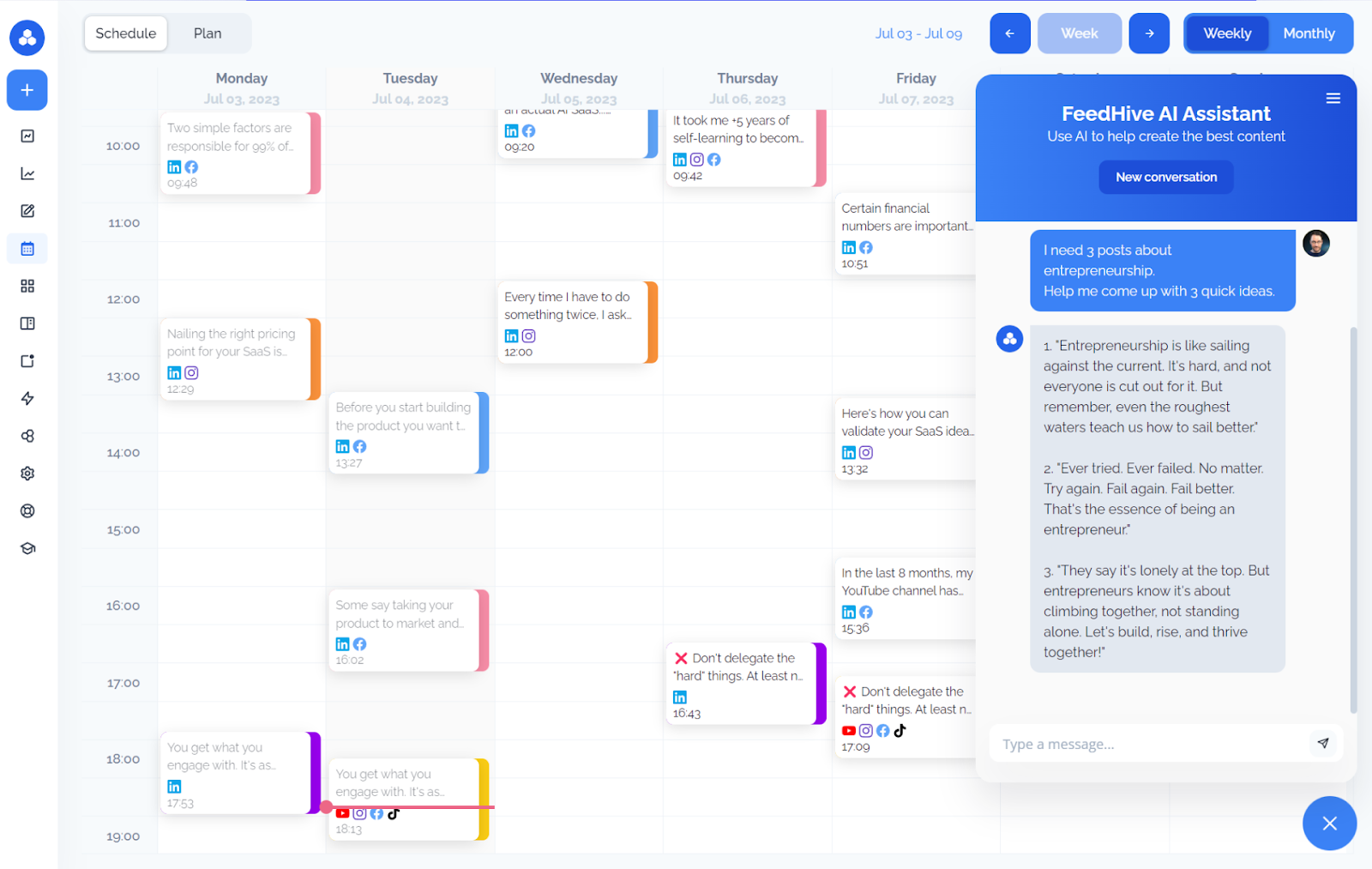
FeedHive offers AI-powered social content creation and scheduling with tools designed for solo creators and growing teams. It leverages analytics and machine learning to suggest the best time, tone, and format for every post.
Key Features:
- Smart caption generation and post recycling
- Engagement prediction and content scoring
- AI-driven repurposing of top-performing posts
- Hashtag suggestions and visual content planning
- Collaboration tools and content calendar
It’s ideal for scaling consistent and engaging brand messaging across multiple channels.
Marketing Optimization & Personalization Tools
Marketing optimization and personalization tools leverage AI to analyze data and automate decisions, ensuring that content, product recommendations, and user interactions are as relevant and personalized as possible.
23. Trellis
Best for: AI optimization of eCommerce advertising and dynamic pricing
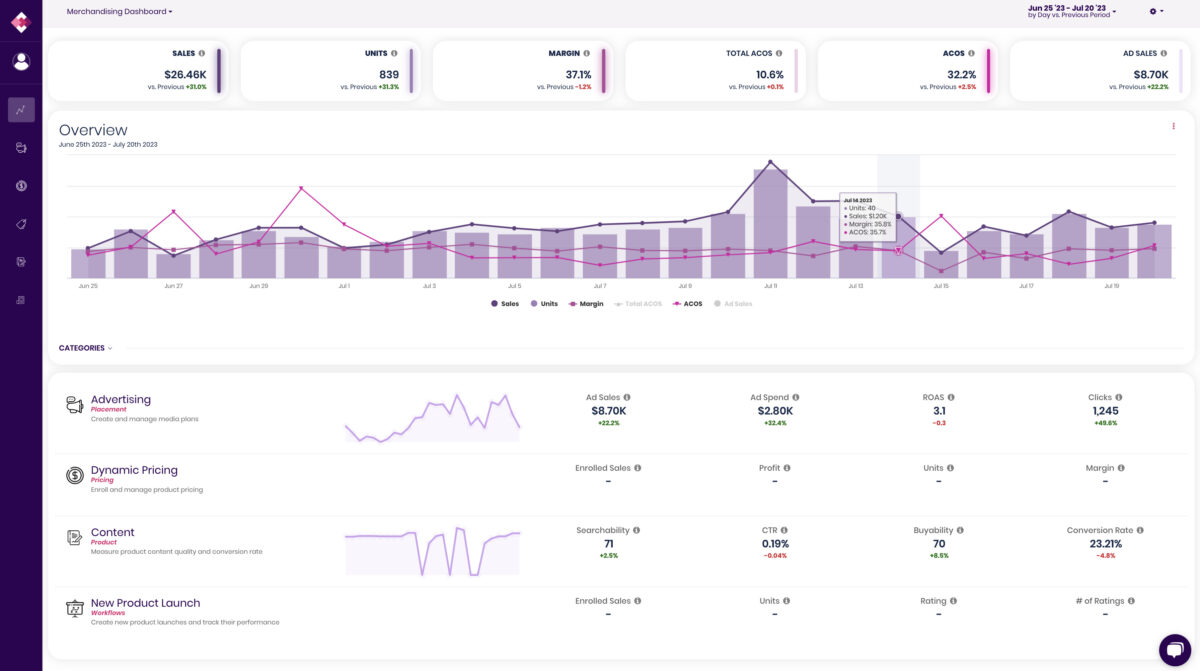
Key Features:
- AI-powered Amazon and Walmart advertising automation
- Dynamic pricing engine that adjusts based on demand
- AI-generated product content for search optimization
- Cross-platform performance dashboards
- Real-time competitor benchmarking and keyword suggestions
Starting price: Custom pricing (tailored to large e-commerce clients).
Primary use case: Maximizing online marketplace sales.
An online brand selling on Amazon can use Trellis to handle the complexity of thousands of keywords and bids. Instead of manual PPC tuning, the AI optimizes 24/7, reacting to trends like a spike in competitor bids or changes in conversion rate.
For example, Trellis might detect that on weekends, conversion improves, so it raises bids and also tests a slightly higher price – if sales hold, it finds extra margin.
24. Evolv.ai
Best for: Brands seeking to automatically test and optimize user experiences through AI-driven experimentation and personalization.
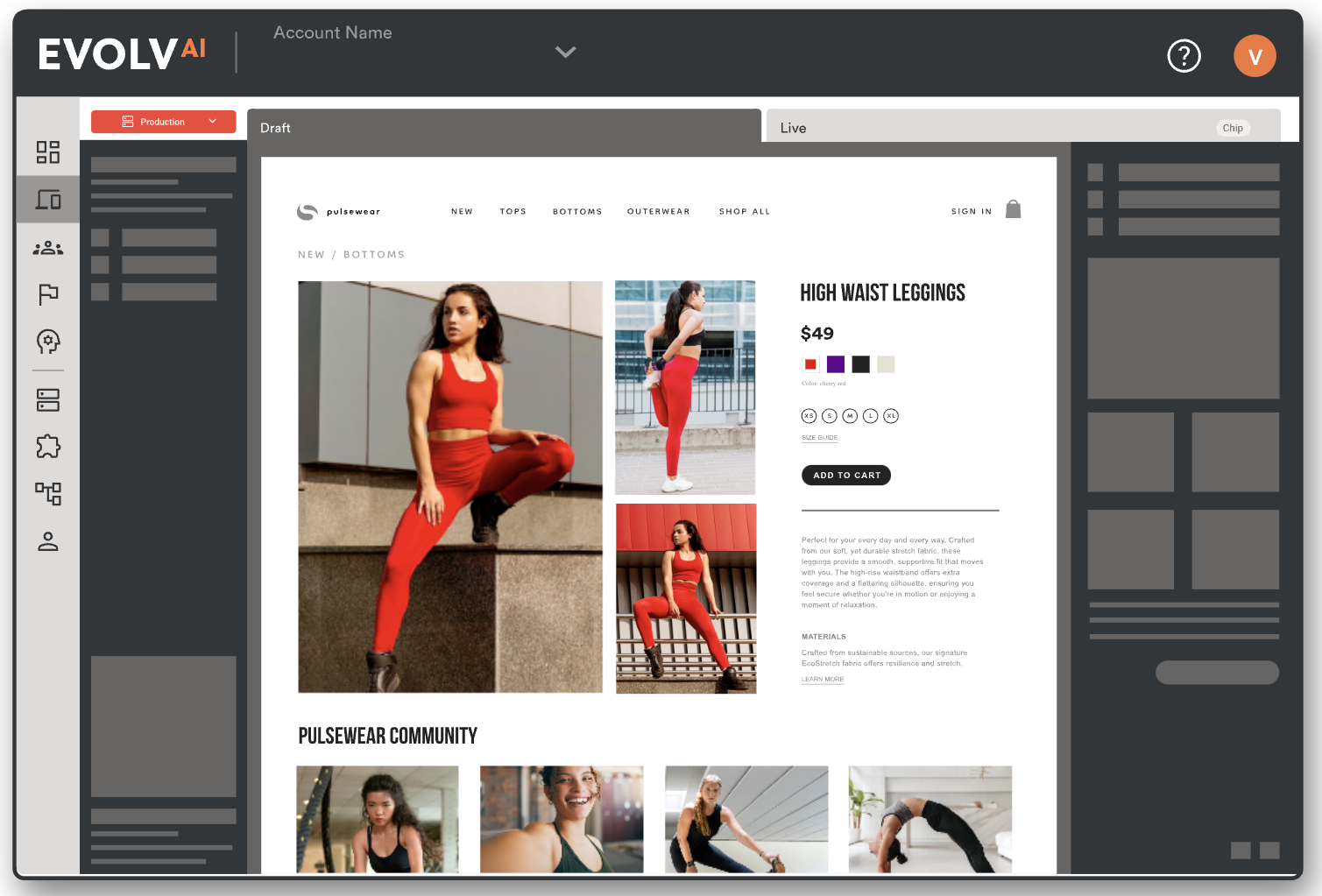
Key Features:
- AI-generated variations of UX elements
- Multivariate and A/B/n testing engine
- Continuous experimentation at scale
- Causal inference to explain performance changes
- Integration with Google Analytics and CRO stacks
Starting price: Custom (enterprise SaaS).
Primary use case: Conversion rate optimization (CRO) at scale.
For example, an e-commerce retailer with millions of visitors can have Evolv test dozens of design ideas in parallel (different hero image, different copy, trust badges, etc.) rather than one by one. The AI identifies winning combos and even personalizes by segment (maybe traffic from ads responds better to variant A, while organic visitors prefer variant B).
25. Seventh Sense
Best for: Optimizing email engagement rates through AI-powered timing and frequency personalization for each recipient.
Pricing: Starting at $80 a month, billed annually for Hubspot. Starting at $450 a month, billed annually for Marketo.
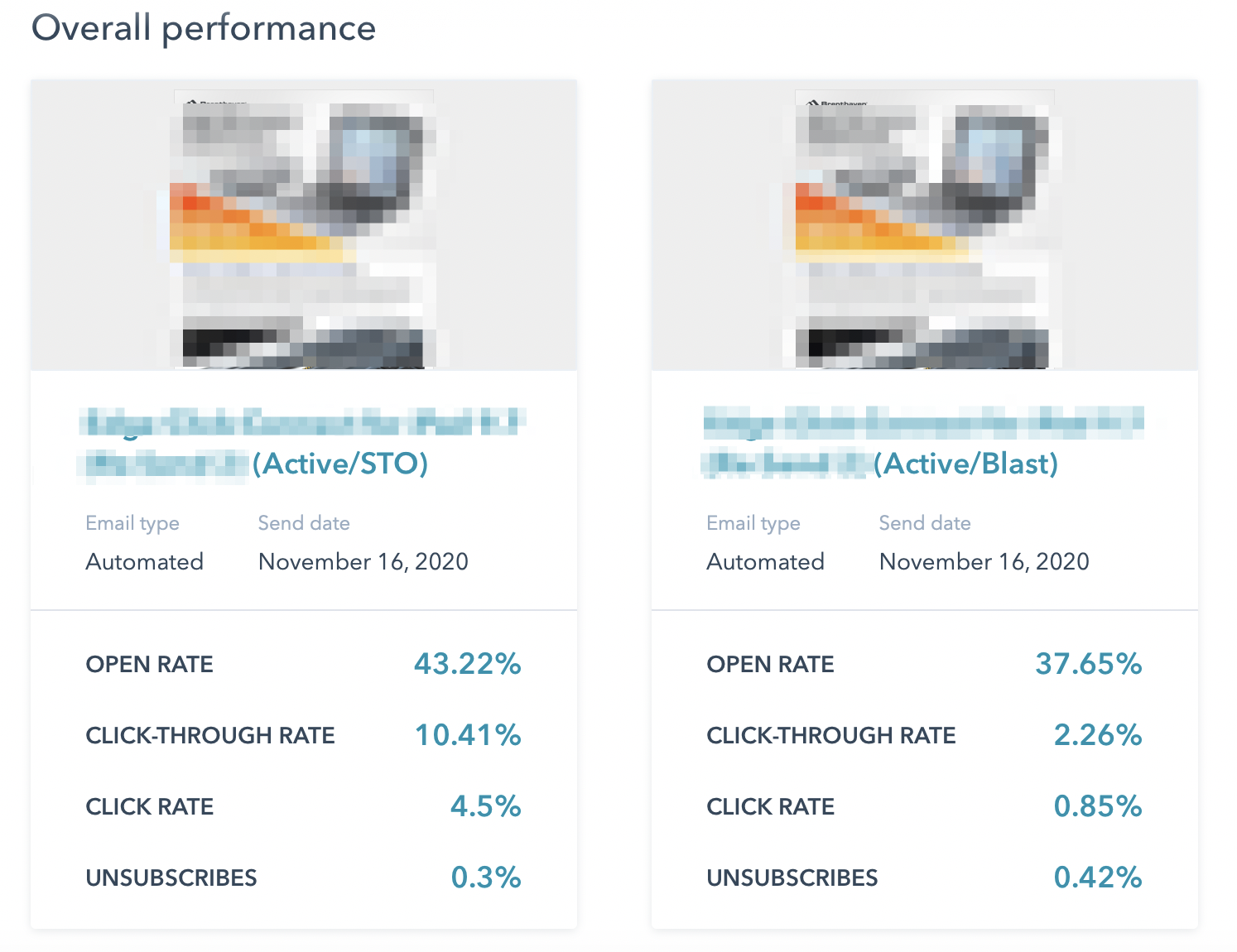
Seventh Sense improves email engagement by personalizing the delivery time and frequency for each recipient based on their behavior and historical interaction patterns.
Key Features:
- AI-optimized email delivery windows
- Adaptive send frequency based on recipient engagement
- Machine learning models trained per contact
- Performance analytics by cohort and time
- Seamless integration with HubSpot and Marketo
Best for marketers focused on improving open and click-through rates without overhauling campaign content. The downside of the platform is that it is designed specifically for HubSpot and Marketo and doesn't work with any other email marketing solutions.
26. Fullstory
Best for: Marketers seeking to understand and improve user interactions through detailed session recording and real-time analytics.
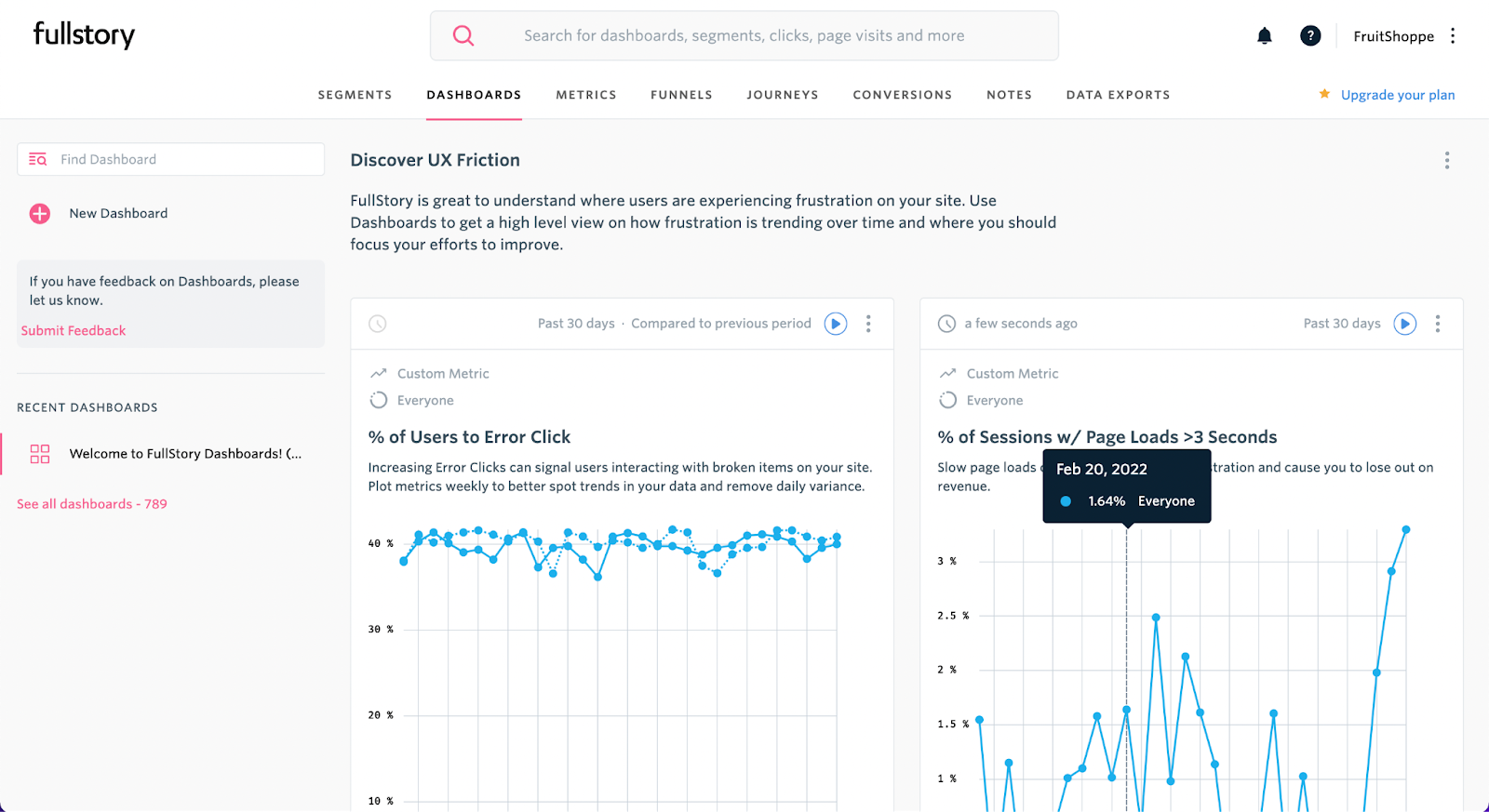
Key Features:
- AI-powered session summaries and frustration detection
- Predictive analytics to improve UX and conversion
- Natural language search for behavior insights
- Funnel analysis and event tracking
- Privacy-first design with GDPR/CCPA compliance
Starting price: Free limited version; business plans custom priced.
Primary use case: Improving UX and conversion by fixing hidden issues. Product and marketing teams use FullStory to discover problems that traditional analytics miss.
For instance, an insurance company’s marketing team could identify that users on Safari encountered a form bug, causing 30% to fail quote requests – something revealed by FullStory’s frustration signals, not just aggregate metrics. By quickly finding and addressing these UX issues, companies recoup lost revenue.
FullStory’s AI insights help prioritize fixes that matter most (e.g., it might alert that a broken link is causing a big drop in a high-value segment).
AI Workflow Automation Platform
Workflow automation tools utilize artificial intelligence to streamline complex processes, minimize manual tasks, and enhance decision-making, ultimately driving productivity and enabling businesses to focus on strategic growth initiatives.
27. HubSpot Breeze AI
Best for: Boosting productivity and eliminating manual tasks across multiple departments.
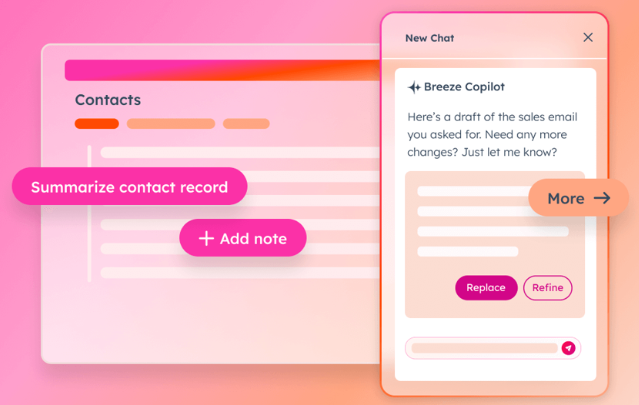
HubSpot Breeze is an AI platform designed to boost productivity across all business operations. It includes task-specific agents to handle email writing, content creation, CRM updates, and campaign prep.
Key Features:
- AI content assistant for blogs, emails, and landing pages
- CRM enrichment and buyer intent analysis
- Meeting summaries and call transcripts
- Department-specific AI agents (marketing, sales, support)
- Seamless integration with HubSpot workflows and data
Starting price: Free plan available; paid plans with AI from $15/month (Marketing Hub Starter).
Primary use case: Boosting productivity for HubSpot users. Midsize and some enterprise teams on HubSpot leverage Breeze AI to automate grunt work. Think of a marketing ops manager who sets up workflows: with AI, they can auto-generate if/then branches (like “if lead hasn’t responded in 5 days, AI craft a follow-up email”).
Sales teams enjoy automatic call notes and next-step suggestions after meetings. By eliminating manual tasks, HubSpot’s AI lets your team focus on strategy and creative tasks. It’s an easy on-ramp to AI since it’s built into an existing platform, requiring no additional integration.
28. Zapier
Best for: Streamlining workflows and boosting productivity with AI-powered task automation and integration.
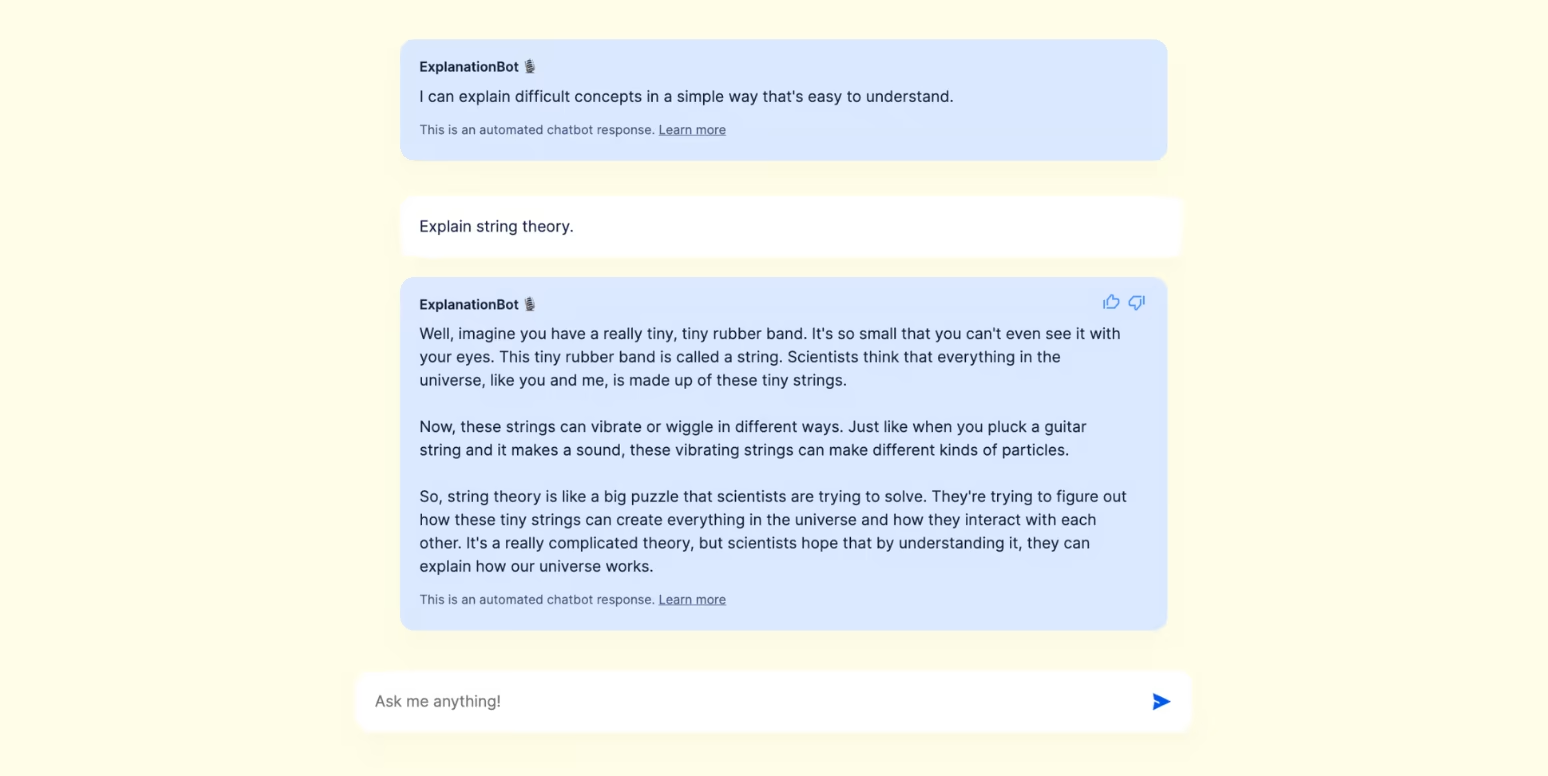
Key Features:
- AI Copilot to build zaps from simple prompts
- AI-powered chatbots with document-based training
- Zapier Canvas: visual workflow planning with AI suggestions
- Smart actions and data enrichment via OpenAI and GPT models
- Prebuilt templates for marketing automation, lead follow-up, and content repurposing
Starting price: Free for basic usage; paid plans from $19.99/month.
Primary use case: Automating across the stack. Marketing ops teams use Zapier to connect niche tools and add smarts.
For instance, an events team could automate webinar follow-ups: when someone attends a Zoom webinar, Zapier’s AI could analyze the Q&A transcript to determine the attendee’s interests, then send a tailored follow-up email via Marketo.
Or social teams might auto-generate a weekly report by pulling metrics from various platforms and having the AI write a summary, delivered to Slack.
Building Your AI Marketing Stack: Where to Start
Buying a tool is just the first step. True success comes from integrating AI thoughtfully into your daily workflows and strategic planning. A solid strategy ensures you get the most value from your investment.
Step 1: Identify Manual, Repetitive Tasks
Start by auditing your team's workload. Where are they spending the most time on tasks that don't require strategic thinking? This could be pulling data for weekly reports, writing basic social media updates, or segmenting email lists. These are perfect candidates for AI automation.
Step 2: Start with a Pilot Project
Don't try to overhaul everything at once. Choose one specific process to improve with an AI tool. For example, use an AI copywriter to generate ad variations for a single campaign.
This allows you to learn and demonstrate value quickly. When evaluating performance, it is vital to use proper attribution models to understand the true impact.
Step 3: Measure Performance and Iterate
Set clear metrics for your pilot project. Did the AI-generated ads have a higher click-through rate? Did the automated report save your team five hours per week?
Use this data to justify wider adoption and refine your approach. Continuous measurement is key to optimizing your use of AI.
Step 4: Train Your Team for AI Collaboration
AI is a partner, not a replacement. Invest in training your team on how to use the new tools effectively. Teach them prompt engineering skills. Encourage them to think of AI as a collaborator that can handle the first draft or initial analysis, freeing them up for more strategic work.
Conclusion
As AI technology continues to learn and adapt, marketing strategies will become more dynamic. Real-time data analysis and advanced marketing automation capabilities will enable businesses to adjust their campaigns on the fly, ensuring optimal engagement and results. In essence, the fusion of advanced AI tools and marketing is paving the way for a more interconnected and responsive digital marketing experience.
.png)
.jpeg)




.png)
